Blog » How to Guides » How To Become A Motivational Speaker: The Definitive Guide
How to Become a Motivational Speaker
The Definitive Guide
If it sounds exciting to move and inspire people with your words, then this is the ultimate guide you have been looking for.
Global figures in history, from Abraham Lincoln to Nelson Mandela, have stood testimony to the deep impact of powerful words and how they have moved people to action.

So if you want to:
- Get started with becoming a motivational speaker
- Find the right framework for your speech
- Find out how to get speaking gigs, monetize your motivational speeches, and sustain and grow as a speaker
- Learn how to earn ancillary income as a motivational speaker
You’re going to find this guide super useful!
I have put together well-researched tips, and shared my own hard-earned experiences, in this guide to help you put your shoulder to the wheel.
Let’s get started.
Don’t have time to read the whole guide right now?

No worries. Let me send you a copy so you can read it when it’s convenient for you. Just let me know where to send it (takes 5 seconds)
Yes! Give me my PDFContents
Chapter 1
The Fundamentals of Motivational Speaking
The idea of motivating people to action has already fascinated you. But you might still be wondering – can I actually do this?
Here’s the thing: yes, you can.
I am going to show you how those from all walks of life, and who have faced every disadvantage in the book, overcame all the hurdles they faced to become successful motivational speakers.
Consider taking a leaf out of their books and you, too, can achieve success as a motivational speaker.

In this chapter, I will tell you about who a motivational speaker is, and what it takes to become one.
What is a motivational speech?
A motivational speech is one that is designed to persuade or motivate people to take positive action to improve their personal and professional life.
It is a highly persuasive form of public speaking that builds an emotional connection with the audience to inspire and encourage them to take action.
Types of Motivational Speeches
Broadly speaking, here are three different types of motivational speeches:
- Speeches Based on Personal Development
Speeches based on personal development are one of the most common forms of motivational speaking. These forms of motivational talk inspire people to find their life’s purpose or follow their dreams.
They are mostly centered around overcoming hardships, finding the silver lining under adverse circumstances, finding acceptance, happiness, or rising above one’s circumstances to live a fulfilling life.
2. Speeches Based on Professional Development
On the other hand, motivational speeches on professional development guide individuals, businesses, or entrepreneurs on how to advance in their vocation, how to stay motivated and find a bigger goal and purpose for excelling in their profession.
The speakers specializing in these kinds of motivational speeches are often entrepreneurs themselves or executives who have led large organizations to success.
During the Covid-19 pandemic, many large corporations have hired motivational speakers to boost the positivity and engagement of their employees working from home.
3. Religious & Spiritual Motivational Speeches
These speeches inspire people to answer to their spiritual calling.
More so, many motivational speakers also address societal issues such as women empowerment and motivate communities to take positive action.
Who is a motivational speaker?
A motivational speaker is a person who can motivate people to achieve their personal and professional goals.
They give inspirational speeches to large audiences, inspiring them to look at things from a different perspective.
Almost all motivational speakers use their personal experiences in their speeches.
For example, they might refer to an obstacle they conquered, adversities they faced, or stories of triumph to drive homemake a point.
Through personal anecdotes, they seek to connect with their audience on an emotional and psychological level. A good motivational speech speaker can leave a profound impact on the audience as it inspires people to look at the positives in life.
Humans are driven by both intrinsic and extrinsic motivation.
Intrinsic motivation, also called self-motivation, comes from within. While eExtrinsic motivation, on the other hand, is something that is external.
A good motivational speaker not only offers extrinsic motivation, but also empowers the audience to find their intrinsic motivation.
Who can become a motivational speaker?
The simple answer is anyone.
One of the requirements to be a successful motivational speaker is to have an innate belief that you can help people change their lives for the better.
There are many motivational speakers who have defied all odds to become successful and set examples for others.
Take — for instance — Simon Sinek, a very successful business speaker.
Sinek is a self-described introvert but that didn’t stop him from facing a crowd of hundreds of people who packed auditoriums to hear him speak.
Even physical disability did not come in the way of some of the most successful motivational speakers.
Born without arms or legs, Nick Vujicic overcame his disability and went on to become the most inspiring speaker.
Lizzie Velasquez faced cyberbullying as a teenager for her appearance. She was born with a rare congenital deformity that prevents her from accumulating any body fat. From being called the ‘World’s Ugliest Woman,’ Velasquez went on to become one of the most inspiring speakers.
There are speakers who have faced financial hurdles and yet scripted their own rags-to-riches story.
Eric D Thomas was homeless and broke before he decided to take charge of his life and complete his studies; Chris Gardner was homeless while raising a toddler son. He became a stock broker and even founded his own brokerage firm.
Some successful speakers like Ray Dalio hold an MBA from Harvard Business School, while some speakers like some didn’t even finish college.
All the above examples show that skill and talent are not the only reasons they achieved their big dream. They believed that their words and story could motivate people to take action.
Your job as a motivational speaker is to empower your audience so that they can realize their true potential.
If you believe that your story and speech can inspire others, then you are ready to begin your journey of becoming a successful motivational speaker.
Chapter 2
Finding your Story
Everyone has a story to tell, but not all stories are inspiring enough or compelling enough for people to listen to them.
If you look deeper, you will see that all of these speakers mentioned in the previous section have certain experiences which make their speech special — from stories of overcoming adversity to incredible feats they have achieved.
So how do we find that compelling story to tell?

In this chapter, I will guide you through the process of identifying your stories, and help you figure out what you can talk about as a motivational speaker.
What is a Hero’s Journey?
Most motivational speeches and inspirational TED talks have one thing in common — a personal story of triumph over adversities.
The speeches usually depict the journey of an ordinary person, who faced challenges but was initially reluctant to take action. Eventually, they overcome their obstacles and embark on a journey to transform their lives.
In short, all of them narrate a Hero’s Journey.
In a Hero’s Journey, an individual leaves his ordinary life and ventures into unknown territory to face a challenge. Despite facing adversity, the individual ultimately overcomes the challenge and returns back to his ordinary life, albeit transformed.
Academic Joseph Campbell defined the three stages of the hero’s journey, back in 1949 —
- The Departure Act: where the Hero leaves the ordinary World.
- The Initiation Act: where the Hero ventures into unknown territory (the “Special World”). Here, the Hero faces and overcomes various trials and challenges.
- The Return Act: where the Hero returns after victory.
Screenwriter Christopher Vogler refined and expanded Campbell’s three-stage structure and divided it into 12 stages.
The 12 stages of the Hero’s Journey is narrated in his book ‘The Writer’s Journey’.
The stages of the Vogler’s Hero’s Journey are as follows:
1. The Ordinary World
2. The Call of Adventure
3. Refusal of the Call
4. Meeting the Mentor
5. Crossing the First Threshold
6. Tests, Allies, Enemies
7. Approach to the Inmost Cave
8. The Ordeal
9. Reward (Seizing the Sword)
10. The Road Back
11. Resurrection
12. Return with the Elixir
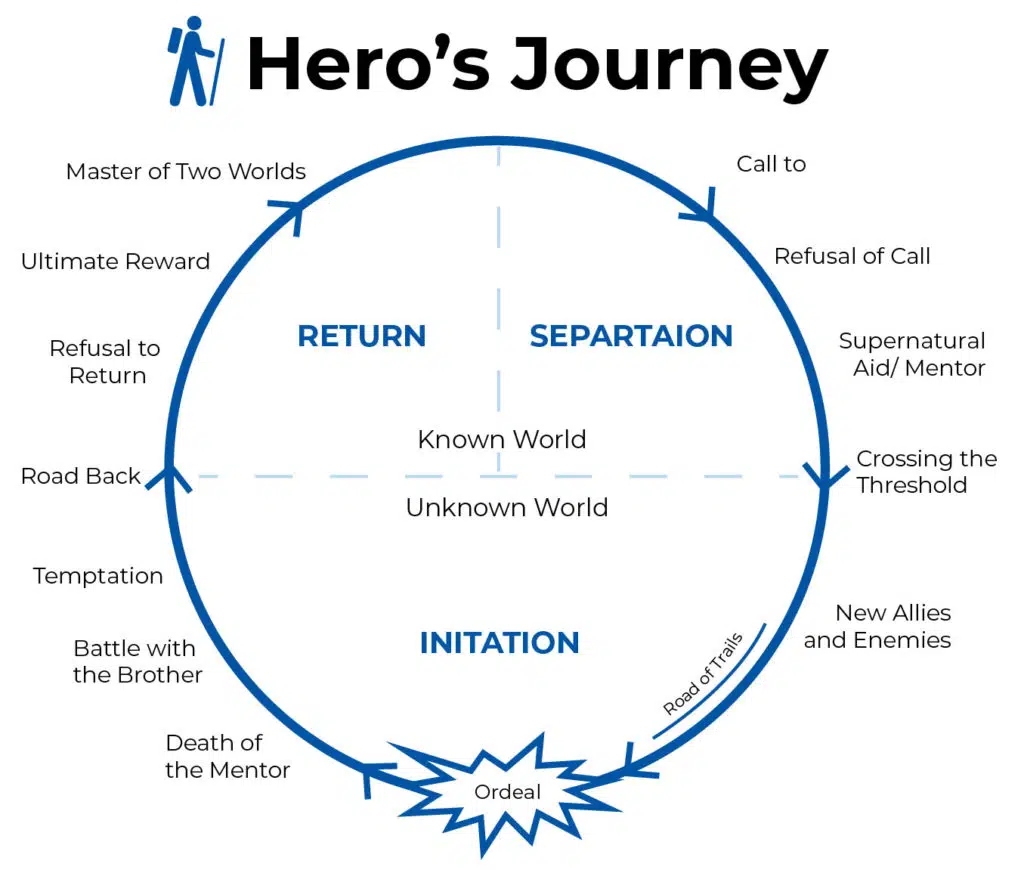
Motivational Speakers and their Respective Heroes’ Journeys
Hero’s Journey not only applies to movies, stories and folktales. It can be used outside the average sword-wielding superhero books and Avenger movies.
Let us dive into a few real-life examples of the Hero’s Journey.
Eric D. Thomas
Born in Chicago to a single, teenage mother on September 3, 1970, Eric D. Thomas was raised in the automobile hub of Detroit, Michigan.
Much to the disapproval of his mother and aunts, he dropped out of high school and ended up homeless on the streets for two years. It was during his street life days that he met a preacher who inspired him to embrace education.
Thomas returned to high school, got his doctorate, became a motivational speaker and changed many lives through his speeches and YouTube videos.
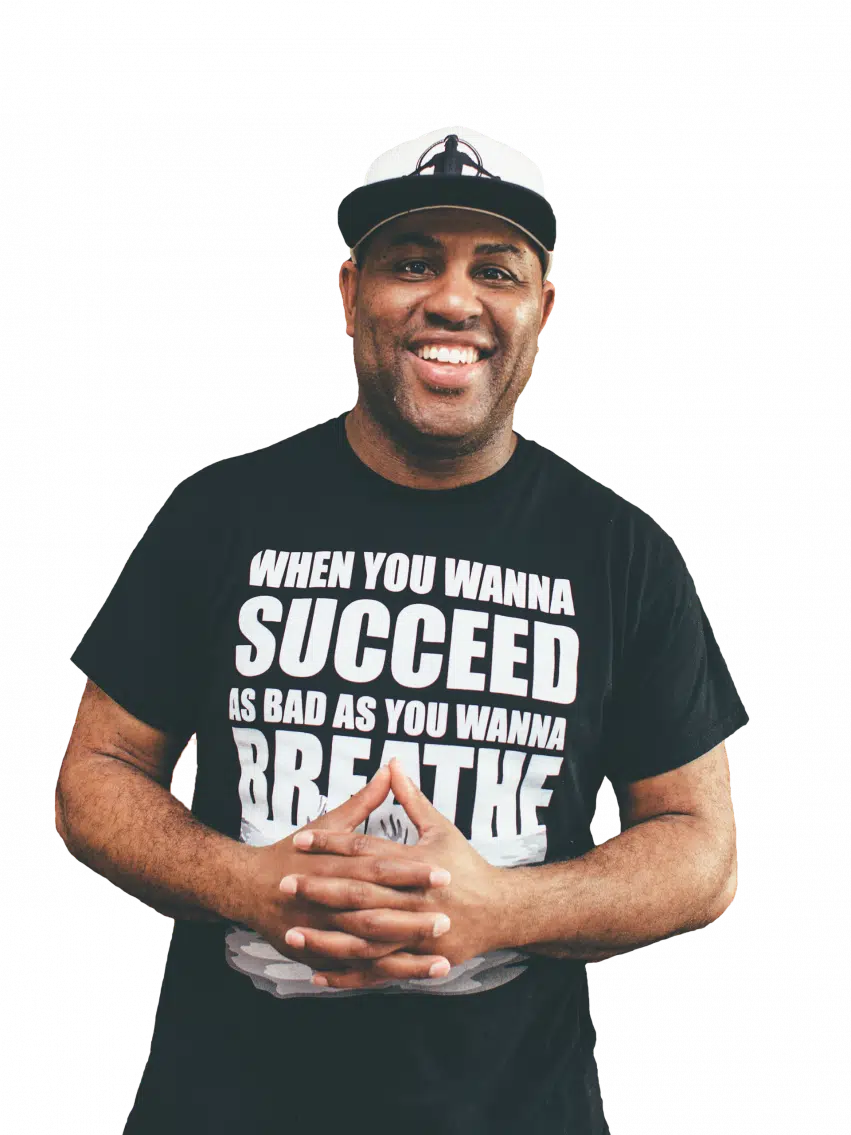
Finding your Own Hero’s Journey
What do ABC, and Eric Thomas have in common?
Well — they are all ordinary people who did something extraordinary and inspiring.
In your life, too, there must have been situations when you left your comfort zone, and had an experience that transformed you.
In your story you are the ‘hero,’ and have to identify the obstacles you overcame to answer your call to action.
Now, ask yourself — which part of your Hero’s Journey have you achieved something great in?
That’s the crux of your talk, right there.
Chapter 3
How to Get Started as a Motivational Speaker
Now, you know what you want to talk about, you have identified your Hero’s Journey.
The next step is to understand the application of your story and who will benefit from listening to your speech.
In this chapter, I will help you identify the application of your talk and guide you to identify the right audience with whom the purpose of the speech will truly resonate.

I will also help you create your niche and stand out from the crowd.
What are the applications of your story?
A motivational speech is essentially an inspiring story, but with a call to action.
Almost every motivational speech starts with a story of either battling the odds, overcoming challenges, conquering fears, or other references from the speaker’s personal life.
Then the speaker goes on to show how the story has affected their life, and to highlight their learnings from it.
Most importantly, it aims to show how the audience can apply the learnings to their own lives.
Your Hero’s Journey is an inspiring story.
Once you have captivated them, use your story to empower the audience to apply your learnings in their own life.
Every motivational speech follows the path of a story and its application. That’s the difference between a feel-good inspirational speech and a motivational speech.
A motivational speech not only inspires the audience, but also motivates them to use the learnings to make profound changes in their life.
If you watch the movie Pursuit of Happiness, the rags-to-riches journey of the protagonist and his success will make you happy and, conversely, his struggles will move you to tears.
But if you listen to Chris Gardner, the protagonist of the story, narrate his life story and talk about his learnings from the adversities, you will feel inspired to apply his learnings to achieve success in your life.
The applications are what will make your motivational speech action-oriented.
Identify your Audience
Now that you have identified your story and its applications, it is important to identify who can benefit from your story and learnings.
Even if you have the greatest story, not everyone may be interested in listening to it.
Once you figure out the subject of your motivational talk, ask yourself who would benefit from hearing your motivational speech.
What is the demography of the audience with whom your story will resonate? What’s their career?
By defining the target audience’s profile, you will be able to craft your message in a way that will resonate the most with them.
For example, Gary Vaynerchuk who is an entrepreneur himself and launched America’s first wine e-commerce sites mostly talks about self-motivation to aspiring entrepreneurs.
For example, Gary Vaynerchuk who is an entrepreneur himself and launched America’s first wine e-commerce sites mostly talks about self-motivation to aspiring entrepreneurs.
His talks resonate in a big way with entrepreneurs and businesses. Other than motivational talks, he also hosts a show called #AskGaryVee, where people can ask him questions about business and entrepreneurship.
Knowing your target audience also helps in marketing.
When you know your target audience, you can focus your energy and marketing budgets to promote and market your gigs to them.
How to Find your Niche
I can’t emphasize the importance of finding your niche in a coaching business enough.
Your story and its application form the base for your niche, and you can develop your niche further by choosing the right target audience, and the right problem to solve for them.
You can benefit from identifying whether your niche can provide you with abundant clients, and whether those clients are able to pay you.
It is, however, important to understand whether the problem you are trying to solve is pressing enough for your audience to pay and listen to your speech.
For example, you might want to choose helping women entrepreneurs as your niche, while someone else targeting the same audience has a niche of helping women entrepreneurs double their lead generation in six months.
Of the two, whom do you think is solving a more pressing problem the client is faced with?
A tool called ‘The Niche Diamond’ will come in handy to help you to define and fine-tune your niche further.
The Niche Diamond asks the 4 critical questions required to define a powerful niche.
The Niche Diamond
The Niche Diamond asks 4 critical questions required to define a powerful niche.
- Are you passionate about your niche?
You need to ask yourself are you passionate about serving your clients in the niche shortlisted by you?
- Is your niche abundant and easy to reach?
Evaluate whether the niche shortlisted by you can provide you with abundant clients, and whether those clients can be reached easily.
- Can they pay you?
Figure out whether your clients have the financial capability to pay you.
- Are you solving a problem worth paying for?
Most importantly — check whether the clients in your niche will want to pay you for solving the problem you are addressing for them.

Follow the Work of Other Speakers in your Niche
The best way to understand what moves and inspires your audience is by following the work of the most successful speakers in your niche.
The idea is not to replicate their style or speech, but to understand and listen to their style of speech; to observe the props they use, and how they use them.
You should pay particular attention to the segments of the talk or speech that move or inspire you profoundly.
Look to attend a few live talks of other motivational speakers in your niche, to get first-hand experience as an audience member.
Notice how the audience responds to different stories and sections of the speech.
However, considering such events are expensive to attend, a cost-effective alternative could be listening to them on social platforms like Youtube.
You can also watch motivational speakers speak in the videos of TED talks.
Chapter 4
Finding the Right Framework for your Speech
Most motivational speakers create their own frameworks for personal and professional development.
Frameworks help you showcase your expertise in the field. They provide the context for your talk, and help the audience understand the big idea you are sharing with them.
Frameworks are also an important marketing tool. Often, the framework is used to develop training modules, podcasts, and other saleable marketing tools.

In this chapter, I will share examples of common frameworks that some leading speakers use.
Why are frameworks important?
Before we look at the examples, let us understand why frameworks are important.
As Mel Abraham, founder of Thoughtpreneur Academy, puts it, “One of the most important and effective tools that set the top 3% of thought leaders apart from the remaining 97% is their use of frameworks. The top 3% craft frameworks that become their signature style.”
Frameworks help you to explain concepts and communicate them in a way that your audience can understand and relate to.
A well-structured framework can engage both the right-brain (emotions) and the left-brain (logic) simultaneously, and move people emotionally and logically.
Humans are mostly visual learners.
The idea behind using a framework is to give your audience a visual reference to your speech. The framework gives a visual pathway to your audience that they can follow to reach their goal.
Examples of Frameworks Used by Motivational Speakers
Here are some examples of frameworks that set the speakers who used them apart from other speakers in their niche. There is no limit to the number of frameworks a motivational speaker can follow.
For instance, Rory Vaden has developed the ‘Take the Stairs: 7 Steps to Real Success’ framework for success.
He also used a different framework to explain ‘Procrastinate on Purpose’ that reveals the 5 ways that ultra-performers multiply their time.
Let’s see how some of the some inspirational speakers have incorporated or created their respective frameworks.
1. ‘Start with Why’ Framework
Leadership expert Simon Sinek created The Golden Circle based on the framework that raises questions. He calls it ‘Start with Why’.
This framework outlines how leaders can promote cooperation, trust, and change in business when they start with ‘why’.
The Golden Circle explains how great leaders are able to inspire and motivate people.
According to Sinek, most people communicate by first expanding upon what they are doing, and then going back and forth to talk about the ‘how’ and ‘why’ of it.
But great leaders, and even organisations, start with the ‘why.’
Why are they doing what they’re doing? What is the purpose?
The Golden circle framework is visually depicted in concentric circles, where the innermost circle represents ’why.’
The next concentric circle is ‘how,’and the outermost circle is ‘what.’
The Golden Circle has three layers:
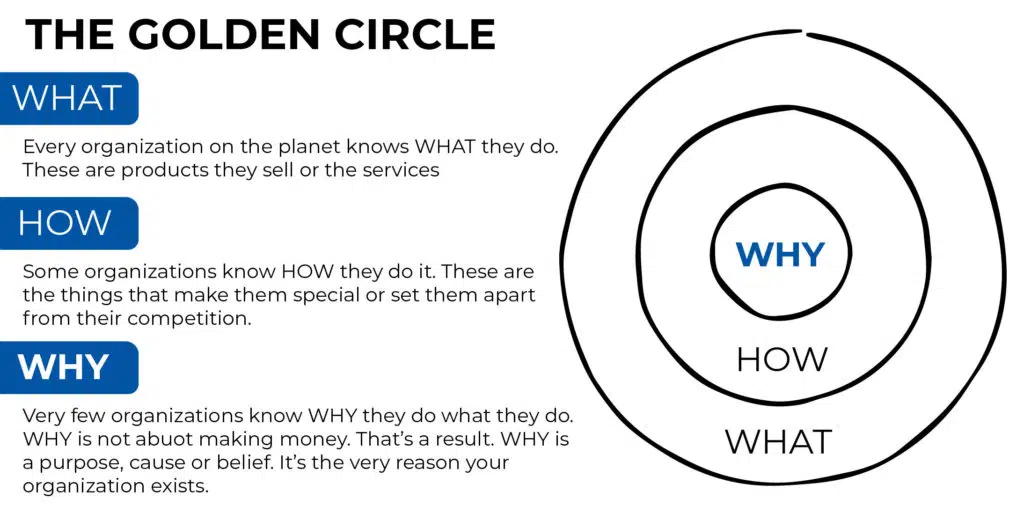
Let’s unravel these three layers:
- Why? — Why do you do what you do? What is your purpose?
- How? — How do you accomplish your purpose?
- What? — What do you do? What is your product or service?
Sinek explains that communicating the passion behind the ‘why’ helps these leaders tap into the part of the listener’s brain that influences behavior.
As the purpose is what motivates people to follow a leader, articulating your ‘why’ (your purpose) inspires your audience to act.
2) Framework for Success
Another leadership speaker Rory Vaden uses his Take the Stairs: 7 Steps to Real Success framework.
In his talk, he uses a 7-point framework on how to overcome procrastination, distraction, and other saboteurs of productivity by building self-discipline.
The steps to real success talks about one’s ability to take action regardless of their physical, financial, or emotional state of mind.
Vaden explains that taking the stairs is a mindset focused on making more disciplined choices everyday.
At its heart, the ‘take the stairs’ mindset is quite simple — make sacrifices in the short-term that will pay dividends in the long-term; he defines this as the Pain Paradox.
It also focuses on the Rent Axiom — a concept which states that “Success is never owned. It is only rented, and the rent is due every day.”
Self-discipline is the simplest way to make life easy and liberate your potential.
The following are the seven principles for simplifying self-discipline:
1. Sacrifice (The Paradox Principle)
The short-term easy leads to the long-term difficult while the short-term difficult leads to the long-term easy.
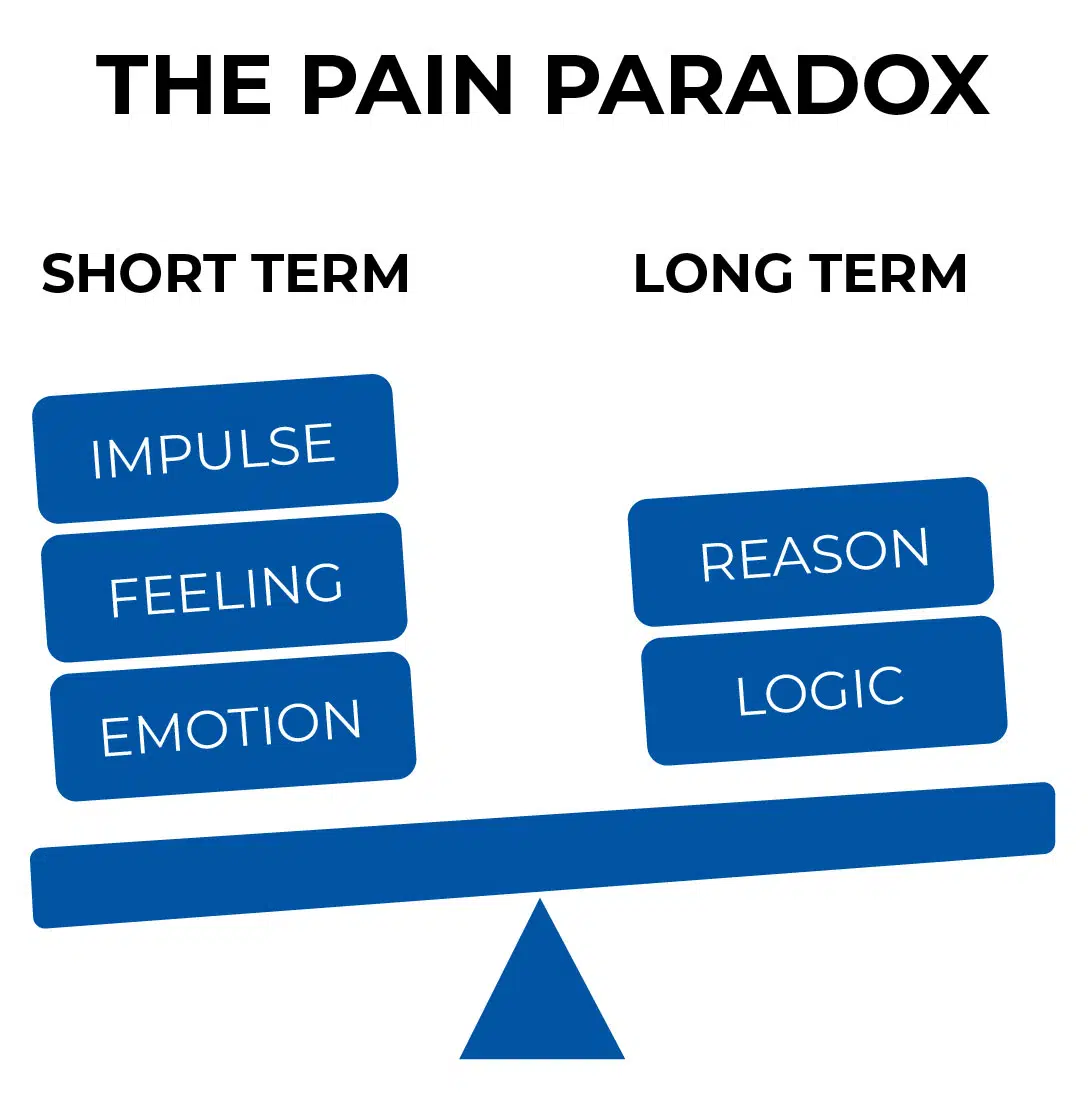
2. Commitment (The Buy-In Principle)
The more we have invested into something, the less likely we are to let it fail.
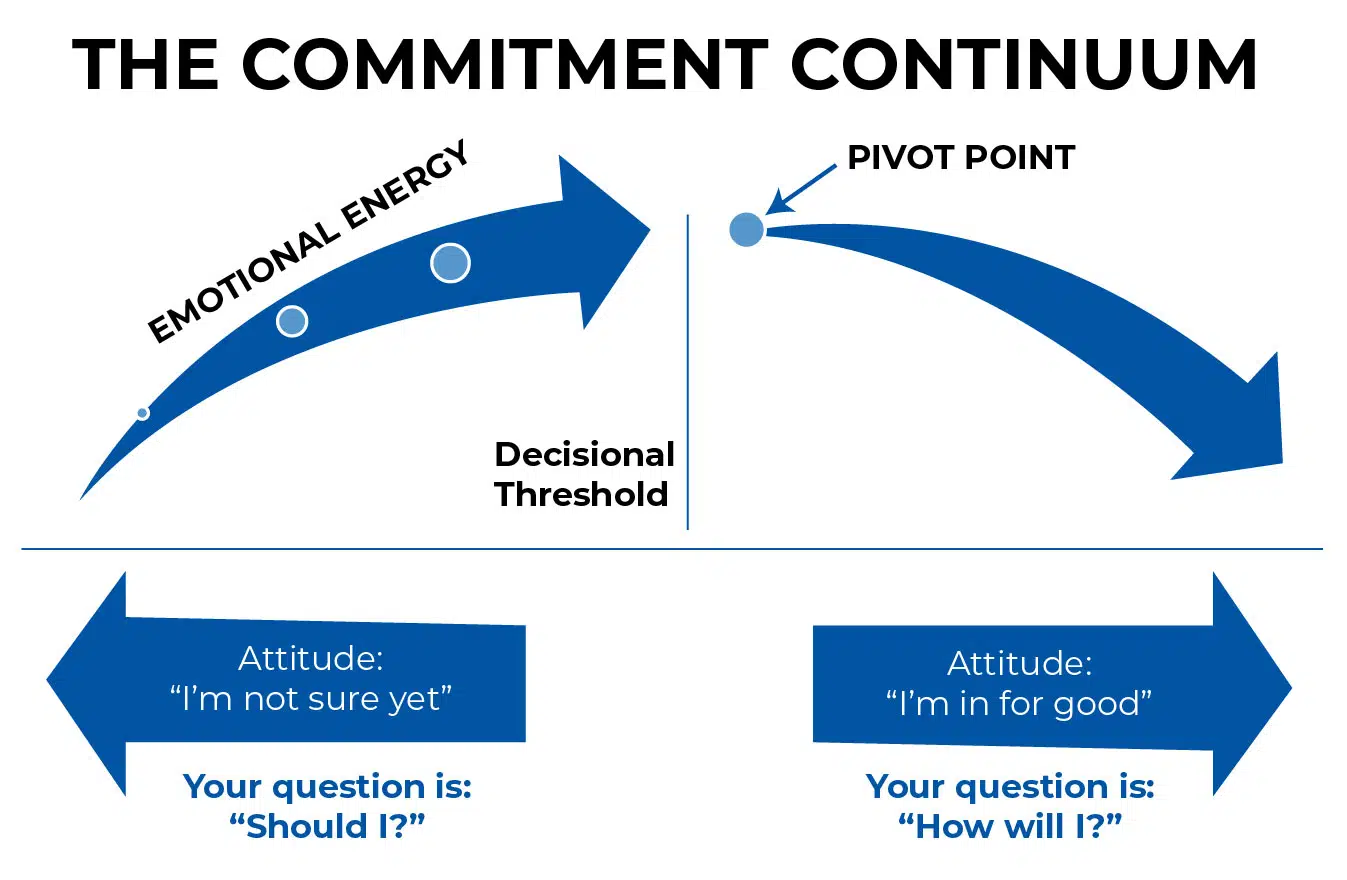
3. Focus (The Magnification Principle of Focus)
Focus is power.
4. Integrity (The Creation Principle)
You think it, you speak it, you act; it happens.
5. Schedule (The Harvest Principle)
Focused effort is amplified by appropriate timing and regimented routine.
6. Faith (The Perspective Principle)
Our ability to have peace is directly proportional to the term of our perspective.
All other 6 strategies of the ‘Take the Stairs’ mindset have to do with achieving success, but this helps us understand what to do with failure.
7. Action (The Pendulum Principle)
It doesn’t matter what we say we believe; our real beliefs are revealed by how we act.
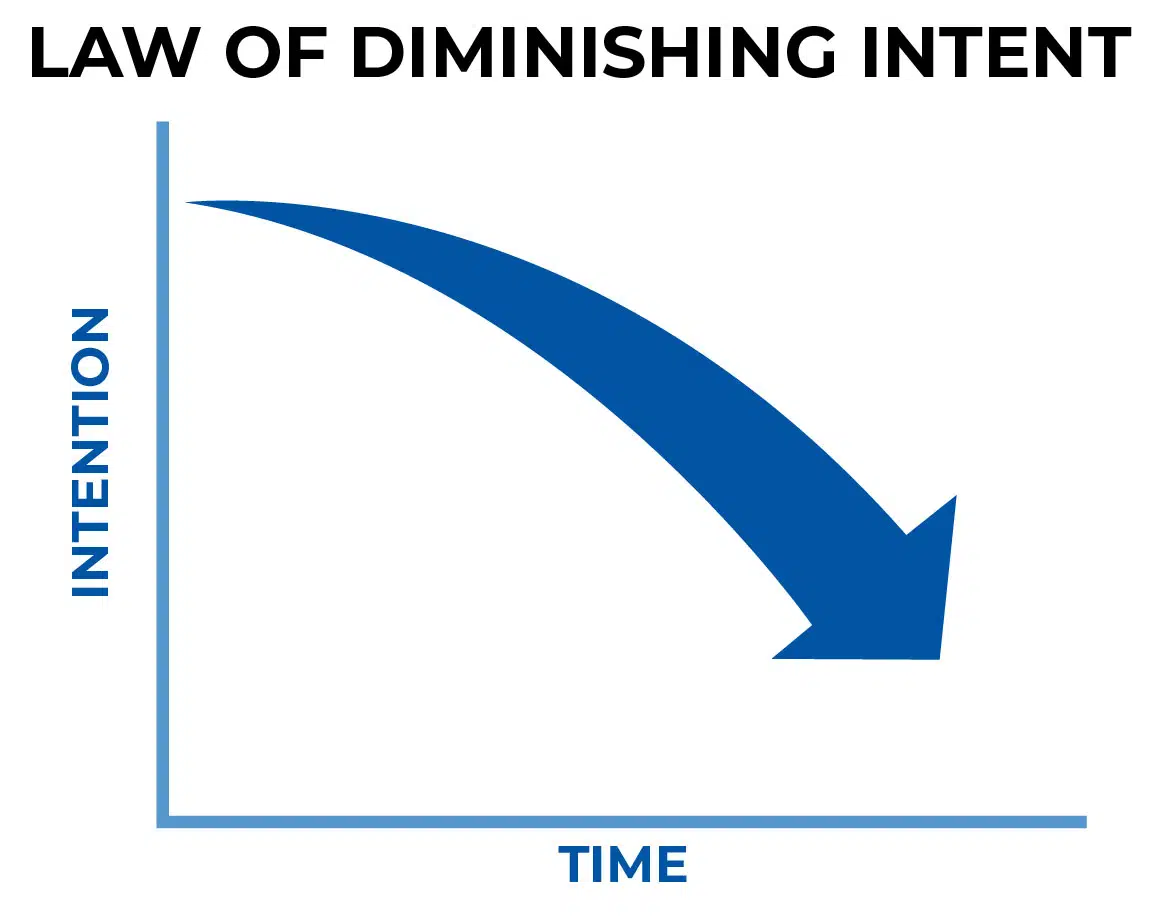
3) Framework for Inspiring People
Les Brown is one of the most successful motivational speakers and thought leaders on self-improvement and goal-setting.
In his talks, he uses his own Hero’s Journey to inspire others. Les Brown uses the framework for creating self-awareness and self-acceptance.
From his lived experience, Brown knows the magnificent impact positive self-esteem has on an individual’s achievement in life.
In his 4 stages of Greatness series, Les explains the four vital stages of personal development:
- Self -Awareness
- Self-Approval
- Self-Commitment
- Self-Fulfillment
His framework also presents techniques one can use to improve relationships, reduce stress, and set and pursue meaningful goals.
His framework inspires people to rise above mediocrity and aspire for greatness.
4) Framework for Selling from the Stage
For my clients I use the webinar framework which helps them to get more business.
I call it the Webinar Framework.
This framework provides a step-by-step guide to how to accelerate your coaching business.
It is designed to work with the client to build their speaking/coaching business from the ground up.
I will talk about this framework in Chapter 8, to help you understand how you can leverage it to earn from side gigs.
Chapter 5
How to Write your Speech
Now that you have identified your niche and your audience, let’s take a look at how you can craft your message to get maximum impact.
A powerful speech needs to be crafted, planned, and practiced.
A good speech is like a script of a movie, it needs to convey the story in its full glory, replete with details and vivid imagery.

Through your speech, you should be able to entertain your audience and take them on an immersive visual journey.
In this chapter, I will tell you about certain key elements which can turn a normal speech into a highly engaging one. I will also be addressing the different ideas that you can use to formulate and write your speech.
Key Elements of a Motivational Speech
Most motivational speeches have the following key elements in their structure, content, and delivery:
- Title of the talk
- Purpose of the talk
- Key points that are supported through arguments, reasoning, and — most importantly — personal stories
- Call-to-action
The title of your speech is like the headline; it should convey the central idea of your talk.
However, for a motivational speech, you want to keep the title informative, yet intriguing.
You don’t want to give away your whole speech in the title; you want your audience to know what they are signing up for, yet retain that element of curiosity that compels them to listen to your speech.
The title could also be the key idea or framework that you develop in your speech.
For instance, Simon Sinek’s TED talk on the Golden Circle is titled ‘Start with the Why’ and Les Brown’s speech on achieving greatness is titled ‘You have greatness within you.’
Your title needs to explain why your audience is listening to you. Think of it as the theme of your talk.
For example, if you are giving an inspirational talk to encourage small business owners to grow their business —
Make it clear that generating the right leads is a challenge for small businesses, and then explain how they can overcome it by using your framework.
While writing your speech, don’t include more than three main points that you want to highlight as it can confuse the listener.
Include stories from your own life to support the main points.
By including at least one personal story in your talk that your audience can relate to, you can engage with your audience emotionally.
The conclusion of your talk most likely will be the part that your audience will remember best, so it is important to make it count.
Try to summarize the main points of your talk and end with a strong call-to-action.
Steps to Writing your Speech
After having done the hard work of identifying the subject, the purpose, and the key points or call-to-action of your talk, it’s now time to bring it all together in the form of a speech.
There are three main parts of an effective speech —
- The Opening: A clear beginning where you introduce an idea.
- The Body: An engaging middle, where you expand on the idea and share examples.
- The Conclusion: An impactful ending that drives home the point.
Step 1
Start off by writing the conclusion of your speech first.
When you start your speech with the conclusion, you are starting with a clear end in mind.
Once you know the end, start writing your speech out like a story.
Step 2
Create a flow; if you dissect powerful motivational speeches, you will see that they follow a beautiful rhythm.
Step 3
A motivational speech should appeal to the audience’s emotions. The body of your speech allows you to achieve that. Usually, the body of the speech is the toughest part of the speech in terms of holding your audience’s attention.
Offer evidence, anecdotes, or personal stories to support your main message.
Edutainment or educational entertainment is a good way to make your content appealing to your audience.
Educational content need not be dull; you can add a dash of entertainment to it to make it more enjoyable and relatable to many.
Here’s a glimpse into my Edutainment model that will tell you exactly how to do this
How to Open your Speech
The opening lines of your speech are the most important part of your speech as they set the tone of your talk.
The opening line gives you the opportunity to grab your audience’s attention and pique their interest in your talk.
To make the most of your opening lines, you should come up with ideas that will not only catch the audience’s attention, but also keep them hooked.
Here, I have put together some ideas and styles that you can use in your speech.
Start your Speech with a ‘What if’ Scenario
You can put your audience in an imaginary situation like, “Imagine you are jumping from a plane without a parachute.”
When you encourage your audience to tap into the power of their own imagination, you are allowing them to visualize a situation and paint a picture for themselves, thus effectively captivating them.
“Imagine a big explosion as you climb through 3,000 ft. Imagine a plane full of smoke. Imagine an engine going clack, clack, clack. It sounds scary. Well, I had a unique seat that day. I was sitting in 1D.”
This was the opening statement of Ric Elias’s viral TED Talk ‘Three Things I Learned While My Plane Crashed.’
Ric, who is the co-founder & CEO of Red Ventures, a leading digital consumer choice platform, survived the crash of Flight 1549 on Hudson river in 2009.
Just a minute into his speech, he transposes the audience hall into Flight 1549.
That’s the power of a well-planned speech.
Begin with an Element of Surprise
Beginning your speech with an unusual or surprising introduction also helps grab the audience’s attention.
Jane McGonigal, a designer of alternate reality games, opened her Ted Talk with this:
“You will live 7.5 minutes longer than you would have otherwise, just because you watched this talk.”
Such a powerful opening remark is sure to make the audience sit up and pay attention.
In her talk, McGonigal explains how a game can boost resilience and promises to add 7.5 minutes to your life.
Begin with a Question
I already gave an example of how Simon Sinek uses the question framework.
Starting your speech with a question immediately grabs the audience’s attention and engages them. Pose questions that make the audience think, wonder, and feel curious.
For example, look at the opening lines of Julian Treasure’s speech on ‘How to speak so that people want to listen.’
“The human voice. It’s the instrument we all play. It’s the most powerful sound in the world. Probably the only one that can start a war or say “I love you.” And yet many people have the experience that when they speak people don’t listen to them. Why is that? How can we speak powerfully to make change in the world?”
Open with Silence
Your audience expects you to start your speech, right off the bat.
So when you take a pause or remain silent for a good 5-10 seconds, it makes your audience wonder what’s coming next, and effectively captures their attention.
Let’s take the example of Aaron Beverly, who won second place in 2016 World Championship of Public Speaking.
The title of his speech was 57-word long; once the long title was read out by the presenter, Aaron took the stage and for 10 seconds didn’t say a word.
The audience was already amused and intrigued by the long title of his speech, so they were curious about what to expect next.
How to Close your Speech
The conclusion of your talk may be the part that your audience remembers best.
One of the best ways to end your speed is to briefly review the main points of your talk, and leave with a strong call to action.
You can use some of the following ideas to close your speech:
- Use a short but powerful statement that includes the theme of your talk.
Consider Steve Jobs’ famous last line in his speech at Stanford University, “Stay hungry, stay stupid.”
- Ask a question at the beginning of your talk, and use your conclusion to answer it.
- Complete the story you started by using an anecdote to illustrate your point.
- Use the last few minutes of the presentation to reinforce your call-to-action. Here’s an example of a strong call-to-action, “Grow your business by 50% through this framework.”
- Use awe-inspiring and illuminating statistics to drive home the point when you close.
- Set a question at the beginning of your talk and use your conclusion to answer it.
- Use some impactful quote or — even better — a poem, as Les Brown did to close his speech.
Test your Content
Finally, before you hit the stage, test whether your speech and content are inspiring and motivating.
Getting feedback from family and friends can be useful, but the Internet gives you access to a wider audience.
Before taking up your first speaking gig, you can start writing blogs, creating vlogs, and sharing them online to check whether your content is resonating with the audience.
The feedback and suggestions that you can get from your social media platforms will be useful in fine-tuning and improving your speech.
Chapter 6
Tactical Things to Consider On-Stage and Off-Stage
What do you need to make sure things are in place? Cue cards?
How are you facing the audience? What’s the best way to learn how to speak?
I have created a master checklist of everything you need to ace your stage game, including things that people don’t even think about.

Tips to Consider Before you Go on the Stage
- Practice, practice, practice
You’ve probably heard of the 10,000-hour rule. Malcolm Gladwell popularized this concept in his book ‘Outliers.’
According to Gladwell, it takes 10,000 hours of intensive practice to achieve mastery of complex skills and materials. Remember — no matter how good you think you are, there is always room for improvement. Keep practicing your speech in front of friends, family, or just in front of the mirror.
- Record your practice sessions
This will help you figure out how you can improve your speech further.
- Time yourself
Use a clock to track your time. Try to finish your speech in the allotted time.
- Reach the venue early
Being punctual has its own advantages.
In your case, it will help you avoid a last-minute scramble to the stage.
- Do a test run ahead of your talk
Check the lights and sound. Do a walkthrough of the stage.
6.Engage with your audience ahead of the talk
When you reach early, it allows you to engage with your audience, and understand them on a deeper level. Talk to them to understand what they are expecting.
7.Clean your teeth
No one thinks about these little things!
But imagine a morsel of food stuck between your teeth while you’re live on TV!
8.Clear your throat
Sometimes, phlegm and saliva build up when you are speaking for a while, and you need to get rid of that.
9.Have a pre-gig ritual to calm the nerves
Your own personal rituals and customs are a great way to get started on the right note.
On-Stage
- Don’t read out your speech, and don’t make it look scripted.
If you are worried you will miss some important points, then use some memory tools like cue cards.
- Pique your audience’s curiosity.
Give them just a teaser of the value and wisdom you are going to offer them, and you’re sure to keep them hooked.
- Use PowerPoint Presentations to your advantage.
I use a hundred slide decks for my presentation with very little text on each slide.
You can download the template of my presentation here.
- Use cue cards or screens.
Some big stage speakers have two TVs, one that the audience sees in the background, the other has cue cards.
- Incorporate visual aids, props, or equipment.
Use impactful visuals in your presentation. It not only breaks the monotony of spoken words but also stays with the audience.
The old adage ‘A picture is worth a thousand words’ still holds true today. I used this image for one of my training sessions; this is the picture of the first video I created of a product that failed.
I use this image to show how, and from where I started, telling the audience the backstory of why I am covered in flour and still recording, since I had to complete the task by night.
6.Communicate with your body language.
Connect with your audience using your body language and emphasize what you want them to take away from your speech.
Don’t talk down to them, but use language and words they are comfortable with.
7.Learn how to use pauses to your advantage.
Each new thought should begin with a pause, as if you are starting another paragraph. A pause is an excellent opportunity to gauge your audience’s reaction, give them time to process the information, laugh at your humor or just create some drama.
8.Focus on your delivery.
You can sign up for some public speaking courses or listen to podcasts to improve your speech delivery.
You can find some effective tools and videos here.
9.Use the full stage.
Don’t hide behind the lectern.
10.Ask questions.
Wherever possible, throw a question at your audience to keep them engaged. You can also include worksheets that the audience needs to fill out.
11.Adapt, evolve, overcome.
Multiple things can go wrong with your speech. Don’t panic; just go with the flow.
12.Maintain cultural sensitivity.
Ensure that you are not cracking a culturally-inappropriate joke.
13.Express yourself clearly.
Make sure you express yourself animatedly, to capture and keep the attention and interest of your audience. The emotions behind the words need to translate and come through via your delivery.
Look at how Jack Black does it.
14. Stick to the time allotted to you.
15. Include keywords in your speech for social media
In the era of social media, you need to focus on the right usage of keywords throughout your speech.
Your audience is likely to Tweet or make social media posts about their experience. So make sure you hit all the right buzzwords, and share ideas that can be broken down into simple hashtags.
For example, Mel Robbins, a motivational and keynote speaker, breaks down the takeaways from her talks in such a succinct manner that when you search on social media with the hashtag ‘Five-Second Rule’ you will get hundreds of testimonials and posts.
Off-Stage
- Hang around to talk to your audience after the speech; it helps you get immediate feedback.
- Have an on-venue mechanism to collect feedback from the audience.
- Follow up with the contacts.
Now that I’ve taken you through the tactical things to consider both on and off the stage, let’s dive into how you can actually get speaking gigs.
Chapter 7
How does a Life Coach get speaking engagements?
You know all the tactical things by now, but how do you get gigs? What’s the shortest path between you and your first paid speech?
Getting the first speaking opportunity might seem like a Herculean task, but — with the right strategy — you can nail it.

In this chapter, I will be delving into the groundwork you need to do before looking for a paid gig, along with some useful tips on how to bag that first gig.
Build your Online Presence
We hate to break it to you, but in today’s digital era if you don’t exist online, you may as well not exist.
Chances are — anyone you approach for a speaking gig will Google you.
It is a place where they can read about you, understand the kind speech you deliver, and whether or not you are the right fit for their event.
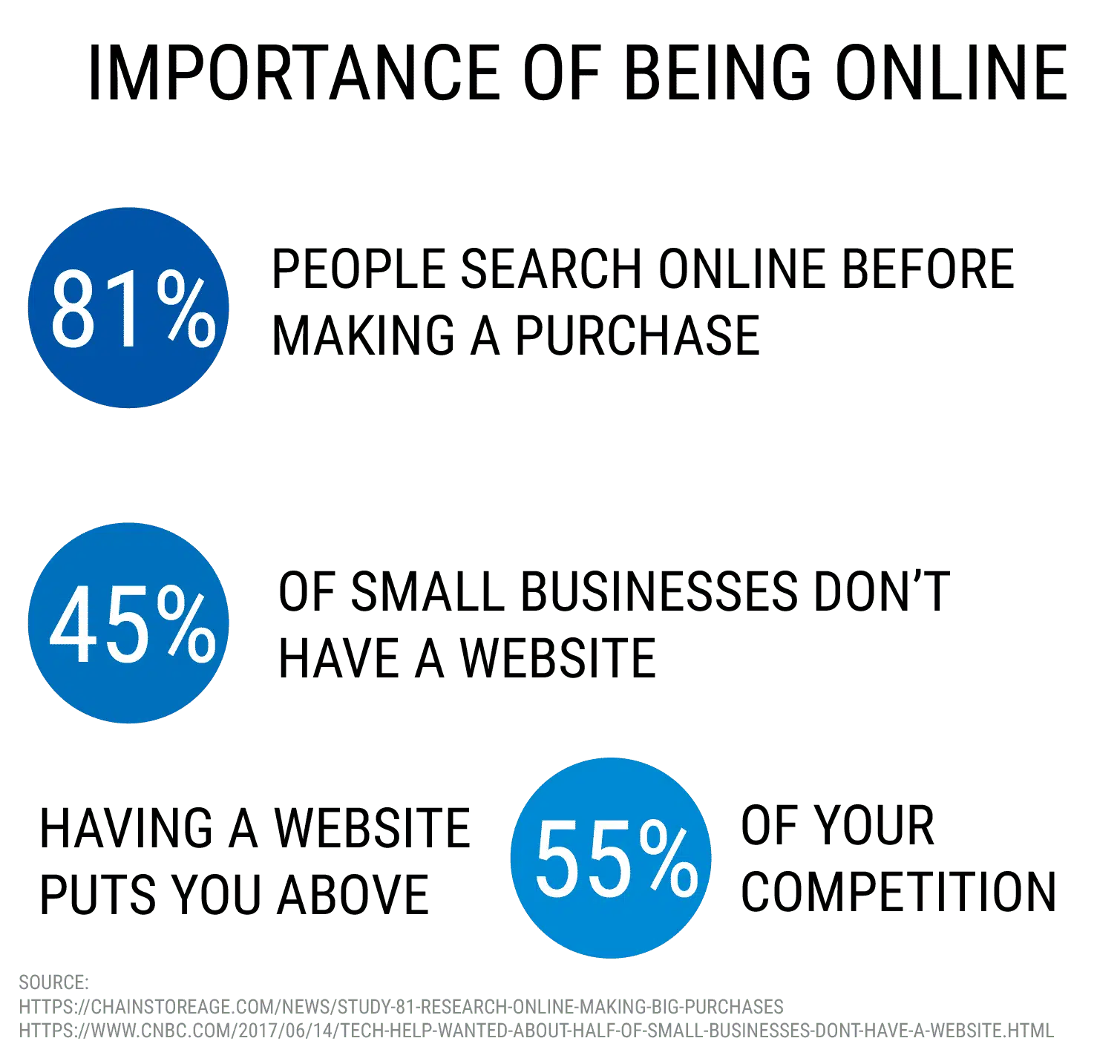
Even your friends or acquaintances who want to refer you to others, find it easier to share a website link with the relevant people.
If you are, for example, creating your website, it is recommended that you use your name as the domain name. Almost all motivational speakers use their own name as the domain name for their websites.
As a motivational speaker, you are marketing yourself; you are the product and it starts with the name.
Here are a few thing to keep in mind when you are designing your website:
- Create your website keeping your target audience in mind.
If you are a motivational speaker who addresses executives on professional development, then your website should look sharp to appeal to that audience.
- Include important and relevant information in your ‘About Me’ section.
Don’t upload your resume, and definitely don’t share too many personal details about your favorite food or color, unless it has got something to do with your speech.
Remember: your website visitor is looking you up to understand why you qualify to be a motivational speaker.
- Have a ‘Contact Me’ section.
This is where people should be able to reach you or leave a message for you.
- Create relevant content for your website.
Write evergreen product content for your website in the form of blogs or vlogs.
- Create a demo video to give your prospective client a sneak peek.
- A demo video is like a tasting menu, allowing the client a free sample of what you have to offer. Include a short video that shows you speaking to a live audience.
Prepare your Elevator Pitch
Choose your words well when you are trying to describe your gig.
Simply saying that you are a motivational speaker is not good enough.
Just like your speech, you have to craft your elevator pitch carefully. It should contain all the key elements that you are trying to highlight, including:
- Who you are,
- The topic of your speech,
- How it will benefit the client.
Framing the right pitch is essential for attracting the right set of clients.
Here is how the motivational speaker Josh Sundquist introduces himself on his website:
His pitch from the time when he was fifteen—
“Hi, I’m Josh Sundquist and I’m a fifteen-year-old cancer survivor. I give speeches about goal setting to help students reach their dreams. Any chance I could share my story at an assembly at Washington Middle School?”
Today, he says something like this—
“My name is Josh and I’m a bestselling author and Paralympian. I give speeches about my training motto one more thing, one more time, to help people face adversity and elevate their professional performance. Do you need a keynote speaker for your sales conference?”
Tapping into Close Networks
Once you embark on your public speaking journey, send out personal emails to all your near and dear ones, friends, colleagues, and acquaintances with a link to your website and a brief on what your work is all about.
Ask them for leads, references, or just a share on social media — every gesture goes a long way.
You never know, maybe someone in your close network has connections and/or is looking for a speaker.
Start with Local Events
Though the idea of motivational speaking conjures up images of TEDx stages or huge auditoriums, chances are that you might not get such big gigs right off the bat.
Start looking for speaking opportunities within your community, or city.
The best places to start with could be local schools, colleges, small conferences.
These small speaking engagements will help you build your credibility as a speaker.
Social media has opened up vast opportunities for every gig worker, if they know how to make the social media work for them.
Facebook, LinkedIn, Twitter, and Instagram are some of the widely-used platforms that you can use to reach out to a wider global audience.
All these platforms are good marketing channels for lead generation. Here are a few tips on how to use them to your advantage:
- Most of these platforms use hashtags to sort information and that can help you find relevant upcoming conferences or events.
If you search for the hashtag #MotivationalSpeakingGigs, it will give you a list of upcoming events around you.
- You can also ask around on relevant Facebook or LinkedIn groups to see what sort of events people are attending.
- Another way is to follow the social media channels of speakers in your niche and see the events they frequent.
Once you know about the events, you can approach the organizers and share your profile and details so that they can contact you in the future for similar speaking engagements.
- Networking on a digital platform is an asset that you must keep building over time, much like networking through events and conferences you attend in person.
Through professional networking sites like LinkedIn, you can also get in touch with key decision-makers in organizations.
- To stay relevant on social media, you have to invest time in creating content. Content on social media is everything!
Create your own content and share it.
Let the message be simple, informative but not preachy. Consistency is the key on social media, as it improves the chances of your prospective clients seeing this.
Attend Networking Events
While networking on social media is great, there is no substitute to in-person networking.
Look for networking events near you and try to attend them. It will give you the opportunity to meet new people within the industry.
Make sure to follow up with the people with whom you have exchanged business cards during any of these events.
If your focus area is professional development, try to attend industry events and business conferences where you can make new contacts.
Forge Partnerships
Joint Ventures (JV) are effective ways of joining forces with other motivational speakers and tapping into each other’s network to grow.
The primary benefit of JV is that it is mutually beneficial.
For a JV to work, you also need to have something that will benefit or help your JV partner to grow. It could be as simple as an introduction to a prospective client.
For example, think of it like a friend referring you to watch a movie. Chances are that you will.
JV’s work in a similar way.
So when your JV partner references you as a good coach, it means that they are putting their trust in you, and that is an important factor in getting a paid client.
As a motivational speaker, you can leverage JVs.
Invest time to know other speakers, especially the experienced speakers in your niche.
Engage with them and their work in a supportive way. Most experienced speakers will be getting a lot of engagements, and they might have to turn down some speaking offers due to paucity of time.
You can check with them whether they would like to refer you for a speaking engagement that they can not take up.
Likewise, when an organizer approaches you for a speaking gig and you can not take it up for some reason, instead of declining the offer, help find them an alternate speaker from your JV partnerships.
I have used JVs solely and extensively to find clients during the first few years of my coaching business. There are three types of JVs:
- Unsophisticated JVs — who have created huge Facebook Groups, Meetup groups by accident. They have not nurtured the audience properly, and neither have they monetized those audiences.
- Mid-segment JVs who
- Sharks — who are the top-end JVs with qualified leads and a high level of engagement with their audiences.
At different stages of your growth, you can tap into and leverage different types of JVs.
When you are starting off, and don’t have a qualified mailing list of your own, it is better to tap into the unsophisticated JVs.
Through unsophisticated JVs, you can create your lead generation funnel to start off.
When you are looking to scale up your business you might want to approach the sharks for partner-swapping, but you must have the ability to promote them back.
Market the Testimonials
Testimonials are like awards or badges of honor. The motivational speaking industry is highly governed by word of mouth.
When someone hears you speak and personally benefits from it, they will recommend you to their friends and family.
Ask your audience to share their experiences on their social media handles, write testimonials, or share video testimonials with you after the event.
There are four types of testimonials that you would preferably want for your website:
- A celebrity testimonial
- Testimonial by an ordinary man
- Testimonial by an ordinary woman
- Testimonial from someone who is an “against all odds” success story.
All these testimonials have their own advantages.
Video testimonials have a strong appeal.
This study found that 2 out of 3 people say they’d be more likely to make a purchase after watching a testimonial video demonstrating how a business, product, or service had helped another person like them.
Check out Chris Howards’s video testimonial. In this video testimonial, he has perfectly summed up what worked for him.
You can find more tools and techniques to get clients fast here.
Use Resources to your Advantage
Leverage the free resources that are available to improve your presentations and public speaking skills.
This may not immediately start giving you paid assignments, but would definitely help you hone your skills and get noticed.
You can join Toastmaster.
Check if there is a local Toastmasters class in your area. They have a Public Speaking Tips page where you can get free tips on honing your skills.
Many of the members of Toastmasters International, including Rory Vaden, have migrated into the professional ranks to earn a living as a speaker.
You can also join Speaker’s Bureaus to get new speaking engagements. However, all the bureaus charge a commission for getting you talks, so be prepared for that.
If you are still a beginner, a Speaker’s Bureau might not be very useful.
However, once you start getting noticed within the speaker’s circuit, a Speaker’s Bureau will be useful in getting you high-end speaking engagements.
You can follow TED Talk videos and attend a TED event if you can. The website has compilations of all the TED talks from where you can learn or draw inspiration.
You can also follow an education seminar company like Success Resources. They have a repository of educational content that you can use. They also have exclusive tie-ups with multiple speakers.
Be Prepared to Speak for Free
Even with all the things in place, it might take some time for you to get your first paid assignment. Your first few speaking engagements might be for free.
Doing small, unpaid engagements is okay. Think of them as building blocks of your speaking career. Whether free or paid, remember a great talk is your best advertisement.
One article in the Harvard Business Review highlights how the author of ‘Promote Yourself,’ Dan Schawbel, shared one of his early free speaking gigs at a college in Massachusetts.
Almost three years later, one of the attendees – who had by then graduated — remembered Schawbel’s talk and recommended him for a talk at her firm.
It became his first paid talk.
Speaking of paid speaking engagements, you must, by now, be wondering how much you can earn from these.
Chapter 8
How can a Life Coach monetize speaking engagements?
It’s possible that some of these questions have been on your mind —
Can I earn a living wage from being a motivational speaker?
How do I decide on my fees?
Should I pursue it as a full-time career?
Can I get rich from this job?
In this chapter, I will try to answer these questions and more.

How do motivational speakers make money?
Motivational speaking may seem like a straightforward job, where you charge to go on stage and speak.
However, it is important to understand that a speaking fee is not the only way a motivational speaker makes money.
As a motivational speaker, you can leverage your brand as a speaker to open doors to other avenues of income. Here are the few ways a motivational speaker can earn:
- A Speaker’s Fee
- Ancillary income
Speaker Fees
A motivational speaker earns through payments received for speaking engagements, this is also called the Speaker fee. Before every engagement, a speaker negotiates their fee with the event sponsor.
Most speakers have a set fee which they often mention on their website.
However, depending on the nature of the event, the budget of the event sponsors, speakers do re-structure their fees.
For example, if the event is spread across two or three days, the speaker can quote a daily rate instead of hourly rates.
It is always advisable to have a clear discussion with the event organizers and clients about what is included in the Speaker fee.
Always check whether the speaker’s fee covers accommodation and flight expenses to the event. Have a written agreement on the scope of work to avoid any confusion down the line.
Mention clearly in your quote whether you are offering only a keynote speech or a keynote speech along with a workshop.
Ancillary Income
There are multiple other ways that a motivational speaker can earn an income. I have covered them in detail in Chapter 9.
What is the salary of a motivational speaker?
A motivational speaker can make anywhere from USD 10,000 to upwards of USD 300,000 a year, depending upon their expertise and experience.
When you first start your career as a motivational speaker, you may need to accept free gigs to gain experience.
Once you build your portfolio, you can start charging anywhere between USD 1000 to USD 5,000 and upwards.
Here is a snapshot of the range of speakers’ fees:
Beginner: USD 0 – USD 1000
Average: USD 1000 – USD 2500
Good: USD 2500 – USD 5000
Very good/Popular: USD 5000 – USD 10,000
Celebrity speaker: USD 11,000 and above
How much should you charge?
Do your research, speak to your peers, and understand the payscale that comes with your job.
Look up motivational speaker salaries and entry-level speaking fees to price yourself right.
Also learn about the different types of motivational speakers. They can either be Platform Speakers or Keynote Speakers.
Platform Speakers are in the ‘Free Circuit’ and they do free speeches that usually sell something (product/workshop/seminar etc.) in their speech.
A Keynote Speaker gets paid, so they refrain from selling anything through or in their speech.
The ‘Cheap’ speaking fees range between USD 1,000-USD 3,000 (plus travel expenses) and the ‘Pro’ Circuit speaking fee is usually around USD 5,000 or more.
When you start out, you may get paid for only 2 out of the 100 speeches you give but as you grow your brand’s presence, you will get more paid gigs and slowly enter the ‘Pro’ Circuit.
Packaging your Offerings
While negotiating with the clients, offer an outcome-based pricing compared to hourly rates.
Take, for example, Brian Peters, who helps financial advisors get more clients through referrals.
Brian used to charge his clients per session; however, he soon realized that though that fee structure was getting him a few clients, the customer attrition was very high.
Customers would leave after one or two sessions. He then moved to outcome-based packages which helped improve customer retention.
Instead of single speaking gigs, you can also offer a package.
Results need time; often, a 45-minute keynote speech is not enough.
For the audience to get results and derive value, speeches need to be followed up by workshops and/or training sessions.
Design and sell your package defined by a dedicated outcome.
Suppose you work with a large corporation who is looking to improve trust and coordination among multiple teams.
Your trust-building package would be a weekend boot camp, where you coach them to coordinate seamlessly among themselves, increase client retention, and decrease staff turnover.
How to Negotiate your Fees
It is not always that your client will agree to the fees you quote.
Most of the time, organizers do have a range of budgets and they would like to start the negotiations from the lower end of the spectrum.
Sometimes, clients genuinely don’t have the budget.
In either case, there is room for negotiations.
When negotiating fees, don’t give heavy discounts just to get the speaking gig. When you give heavy discounts, it puts your credibility in question.
For example, if you had quoted USD 20000 for a two-hour session and suddenly you agreed to do the talk for USD 5000, it would raise some eyebrows.
Instead, you can use an alternate method called BATNA (Best Alternative to a Negotiated Agreement).
Think about the things that you would accept, besides the paycheck, that would help and benefit you.
It could be a lunch with the CEOs after the session, a co-branding opportunity, or just a deal where the organizers will buy copies of your book for the participants.
Ask the organizers whether they can come up with other ideas to offset the low speaker’s fee they are offering.
Having said that, remember that any negotiation only works well when you have a clear goal in mind.
So, always have a fee in mind and try to stick to it.
Ask the event organizers all the important questions that go into an agreement, and then give them your quote.
When should you quit your full-time job?
As I have mentioned earlier, becoming a well-paid motivational speaker requires a lot of commitment, patience, and a lot of hard work.
In the beginning, you may have to do some events for free.
Many motivational speakers, especially business motivational speakers, pursue their passion for public speaking along with their day jobs.
You should only think of leaving your day job and pursuing motivational speaking as a full-time vocation when you have a clear client funnel and business model in place.
Chapter 9
How to Earn Ancillary Income as a Motivational Speaker
One of the ways to earn as a motivational speaker is through a speaker’s fee, as I have already covered in Chapter 8.
However, you can leverage the brand you have created for yourself to earn revenue from multiple sources.
In this chapter, I will highlight some of the ways you can earn beyond the stage.
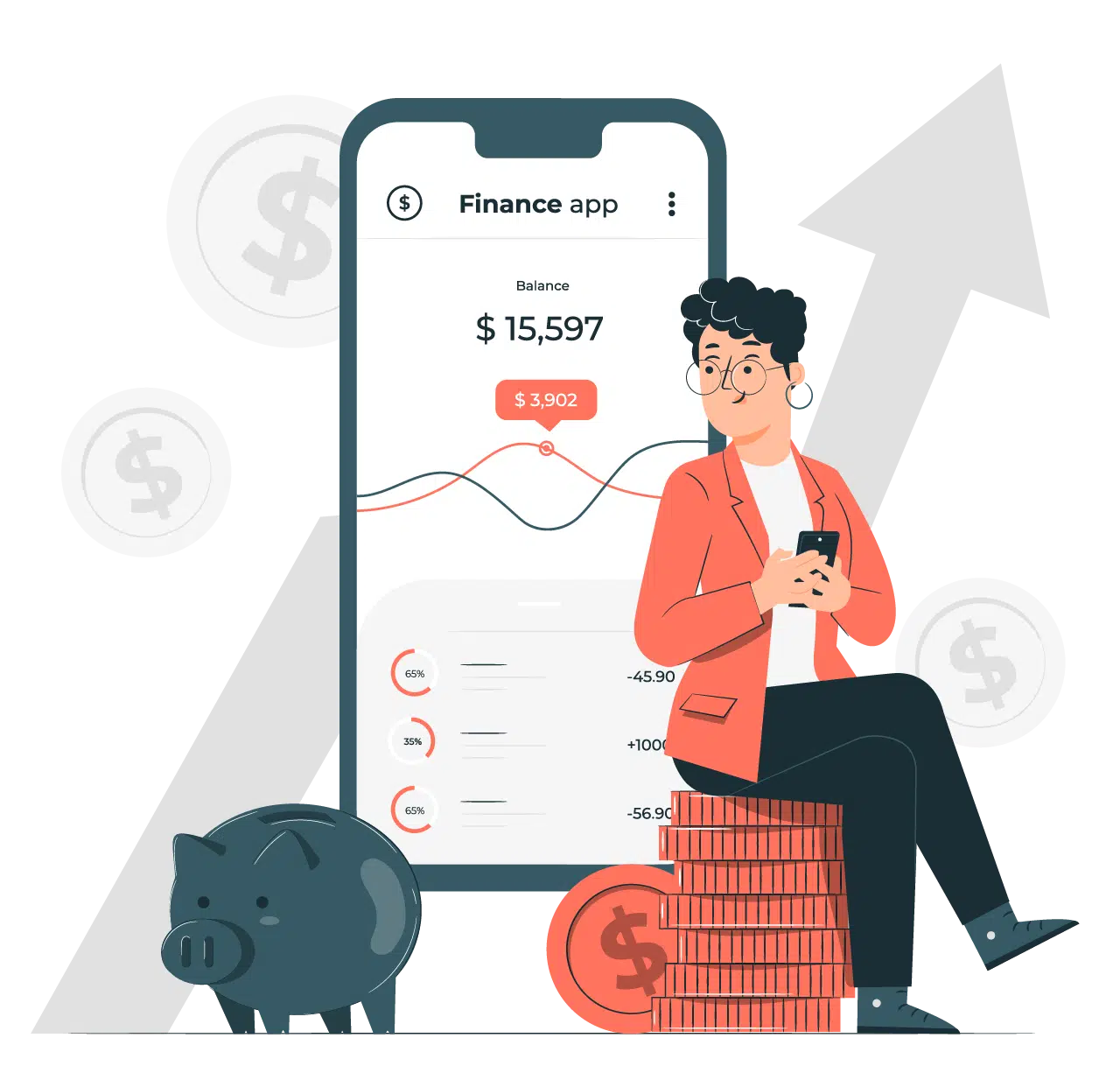
Create a Saleable Resource
Writing a book is an effective way of adding to your earnings.
Write a book that is relevant to your audience. You can make a profit by selling your book from your website, and by promoting it through free speaking events.
Writing a book has a dual advantage.
First, it is a resource that you can market, sell, and earn royalties from; second, becoming an author is a sure shot way of building your credibility.
Books create awe because you dared to do something most people wouldn’t dare to do. It will open a lot of doors.
Write a short book – keep it to 100 pages, 10 chapters, and with lots of visuals.
Or follow Randy Ingermanson’s Snowflake Method to drum out a book.
In the Snowflake method, you can start with a simple idea for the story written out in one line.
Then you build on that idea until it develops into a full-fledged novel.
Webinars
As the world took a fast turn towards the digital world post Covid-19 pandemic, it makes sense to move your speaking gig to the digital world.
Many organizations now looking for virtual keynote speakers and webinars offer an excellent opportunity for your speaking career.
Webinars can be a great opportunity to target and sell your services to a bigger market across the globe.
When you are just starting off, webinars are a good avenue to learn and earn.
However, to use your webinar effectively you must ensure your webinar is structured and builds up upon the content to get the audience’s attention.
For my webinars, I have been sharing with my audiences a framework that helps them launch their six-figure coaching business.
Be a Consultant to your Clients
Offering consulting services as an add-on to your keynote sessions and workshops is a good way to add to your earnings.
If you are a motivational speaker focused on business speaking, you can share your knowledge, expertise, and experience off-stage for a price.
This also allows you to build more credibility with the existing clients and improves your chances of getting more speaking opportunities from the client.
Offer Packages Along with Keynotes
When negotiating with the organizer, pitch for a package along with the keynote speech.
Often, a 45-minute talk is not enough time for your audience to understand the tools and techniques they can use to benefit from your speech.
By setting up training sessions, you can share your framework and train your audience in how to apply the tools much more effectively.
Events such as week-long seminars, half-day workshops, or webinars can bring in more revenue and help position you as an expert in your industry.
Profit from your Content
As a motivational speaker, you have already created a lot of content in the form of blogs, vlogs, and research.
Along with the free resources, create subscription-based or paid resources that your audience can use to continue learning about your topic.
Having a subscription model on your website where your audiences can pay a yearly or monthly subscription, is a good way to earn additional income.
Resources could include:
- Video recording of your talk
- Ebook
- A full how-to guide with checklists and explanations
- A whitepaper
These resources would be very useful for audiences who might want to revisit what you said, and having a video or another resource that they can access at any time is ideal.
Create an Online Course
The Covid-19 pandemic has moved the world online.
The post-event training or workshops usually conducted at the venue may not resume anytime soon. But you can create online workshops and training for your audience for a fee.
Unlike offline training, online courses are self-paced and give your audience the opportunity to learn at their own pace.
For you, the biggest advantage of designing an online course is that you don’t have to physically conduct it.
Affiliate Marketing
This is another way you can add to your revenue.
An affiliate product is something that you have not created.
This could be a book, consulting service, or anything that is related to your talk and beneficial to your audience.
When someone you have recommended purchases the product or service from your affiliate, you get a commission.
This could also be an extension of your existing JVs where you promote the product or services of your JV partner to get access to their mailing list.
Be a Coach to the Coach
You can also open up a steady source of income by coaching aspiring speakers.
You can use your skills to teach others by becoming a speaking coach and/or a speechwriter.
You can coach new speakers on how to craft their messages, in finding their niche, in developing their client funnel. You can create customized one-on-one sessions to train aspiring speakers.
Chapter 10
How to Sustain and Grow as a Motivational Speaker
Getting your first paid gig is just the starting point.
If you want to build a successful career as a motivational speaker, you have to not only grow but also sustain your existing clientele.
In this chapter, I will share some of the important tips that will help you to scale up your business.

Plan for Growth
Let’s face it — it is very unlikely that you will become the most sought-after speaker just after delivering your first talk.
Success requires a lot of skillful planning and patience. Don’t try to go after all the available gigs and expend your energy and resources.
Identify the clients with whom you would like to work, or the events where you would like to participate.
You may not get your choice of gigs in the first year, but be consistent in following up.
As you scale up, you will need a system in place to identify and track the events and when to approach them.
A system helps you visualize and plan your calendar for the year.
Create a Sales Pipeline
When you start scaling up, you need to have a consistent flow of leads.
Explore all the channels from where you can get a steady flow of leads. Emails, for instance, are an effective tool to make your audience engage.
You also need to have a consistent marketing strategy that helps you get leads.
Identifying the effective lead generation channel is imperative to maintain a healthy sales pipeline.
Equally important is tracking and managing the leads coming through any funnel.
I can’t emphasize tracking enough.
I have a team that only tracks all the sales funnels. Once you have a well-defined funnel, use CRM or customer management tools to keep track of everything related to one customer in one place.
Marketing is all about presenting the right message in front of the right audience at the right time.
The CRM will help you understand your customer’s journey, and help you decide when you should pitch for the next talk.
Ramp Up Marketing
No matter how big you become in this business, you are still as good as your last talk.
That’s why you see even the best in business constantly promoting themselves and marketing themselves, even though they are already at the top.
Within your selected niche, there could be multiple motivational speakers who are competing for the same speaking opportunity.
Effective marketing will help you stand out in the market.
Create your online persona and make your presence felt on the social media platforms where your audiences are present.
Have a digital marketing plan in place to leverage the social media platforms whose reach goes beyond borders.
Build a Team
By now, you must have realized that motivational speaking is not just about getting on the stage and delivering a speech.
There is a lot of preparation and hard work that goes behind making any talk successful.
Other than preparing for your own speech, talking to clients, and building your business, you will also have to:
- plan your travel schedule,
- book tickets,
- create contracts,
- raise invoices,
- track CRMs,
- constantly engage on social media,
- create new content.
Sure, you can do most of the tasks by yourself, but you shouldn’t if you want to grow in your profession.
As a speaker, you should focus on tasks that are core to your business such as creating content, talking to clients, delivering speeches, and so on.
Clearly outline what only you can do and where you can delegate the task. Hire a team to whom you can delegate those tasks.
Having a strong team helps you operate seamlessly, and also frees up your bandwidth. It helps you focus on the elements of your business that only you can do.
Build Long-term Relationships with Clients
Your happy clients are your biggest advocates, so try to build and nurture a long-term relationship with your clients.
Your existing clients can refer you to their colleagues and peers in the industry.
Do ensure to exchange greetings and wish them on important days, most importantly with your big-ticket clients.
When you build your credibility and likeability with your big-ticket clients, it gives you an opportunity to upsell your services to them.
Research shows that it costs less to retain existing clients than to acquire new ones.
Vijaya witnessed it with her business. She had immense success with upselling, with a single client purchasing multiple programs.
I have seen the same with my clients. Once someone purchases one of my programs, I see over 60% of them going on to purchase other offerings of mine.

Conclusion
Congratulations on completing this guide!
You took the first step towards your goal of becoming a motivational speaker by finishing this guide.
Now you have all the information you need to go ahead take action.
Remember — taking action and staying in momentum is the key to your success as a motivational speaker.
Have you identified your Hero’s journey?
Which tips did you find useful?
Which part of this guide was most valuable to you?
Do you have any questions that I left unanswered?
Let me know in the comments section and I’ll make sure I address all your queries.

Download a FREE PDF version of this guide…
PDF version contains all of the content and resources found in the above guide.
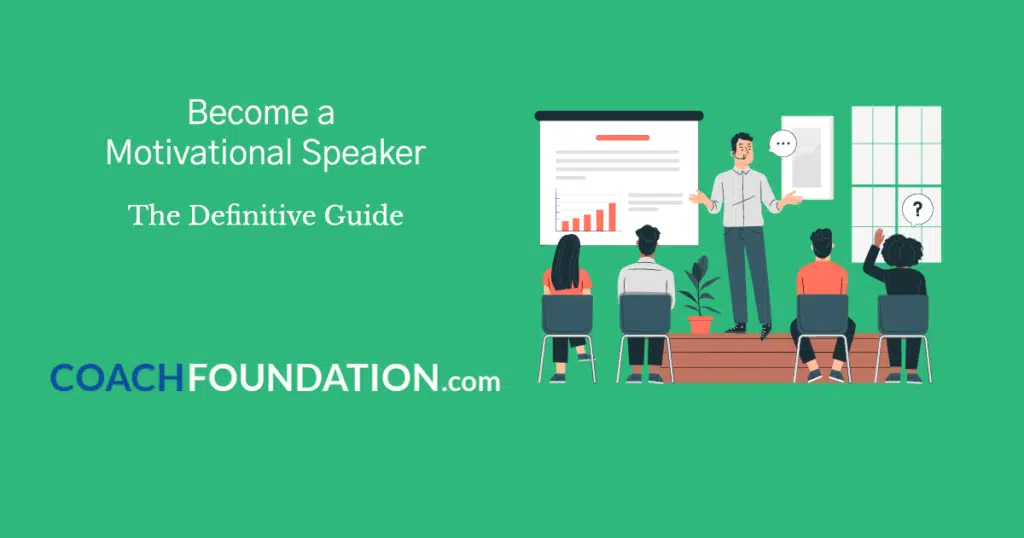









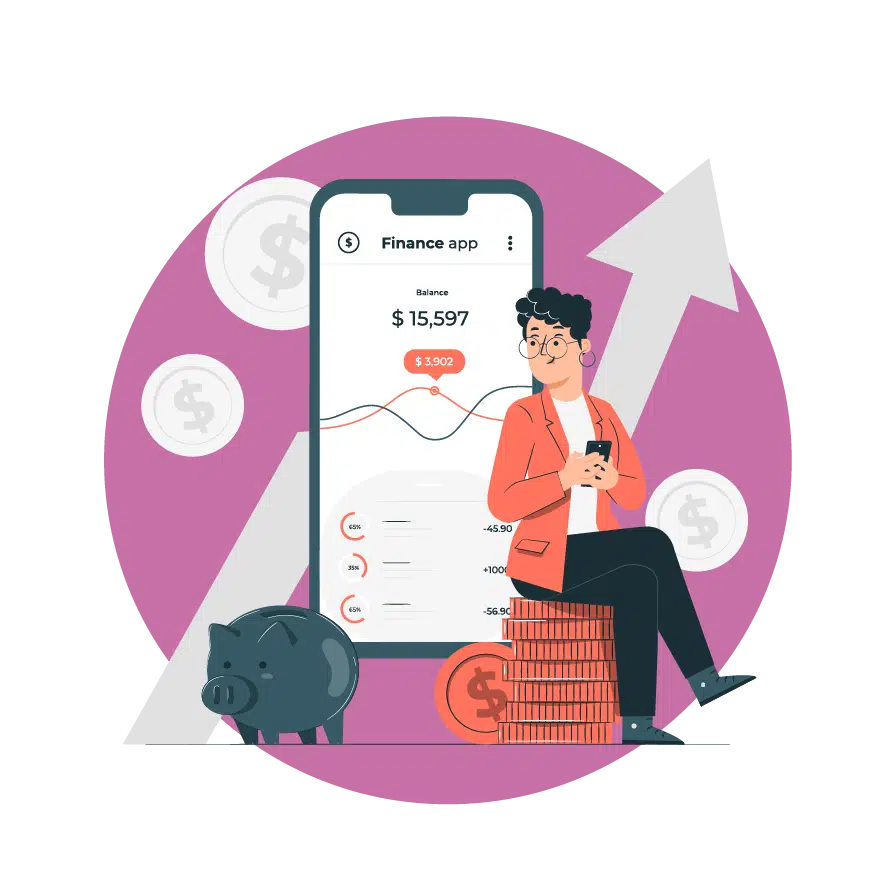

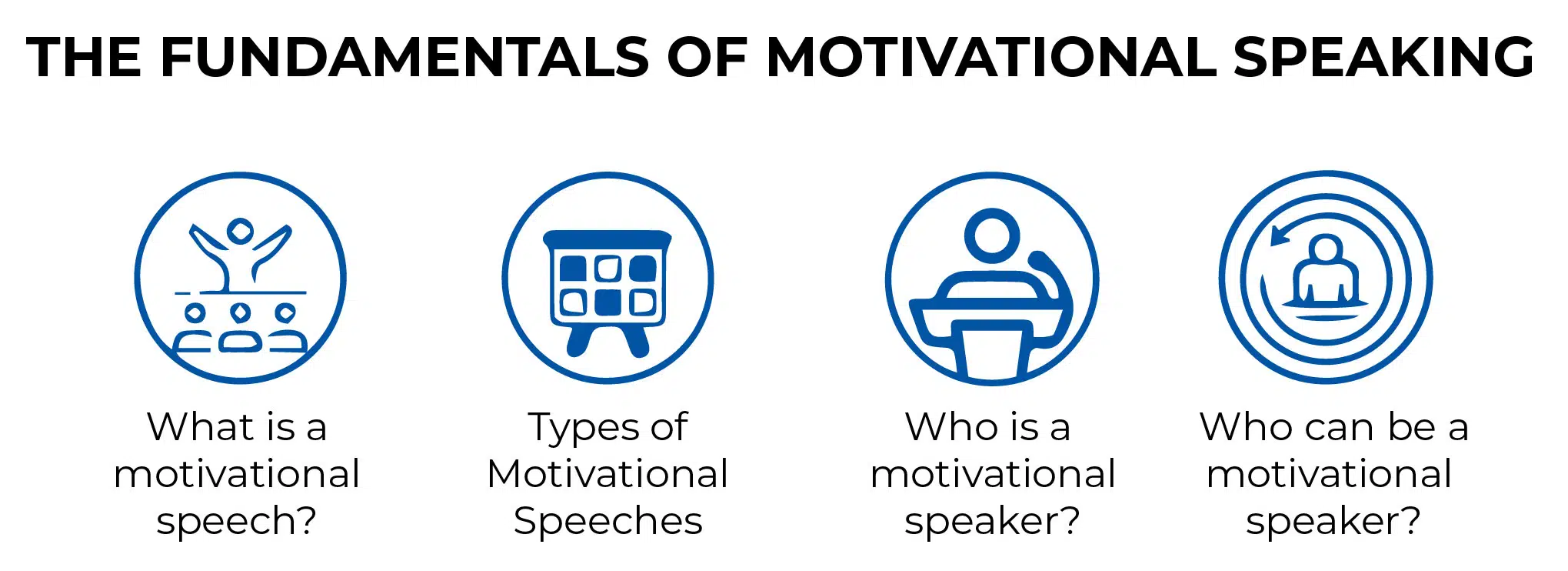
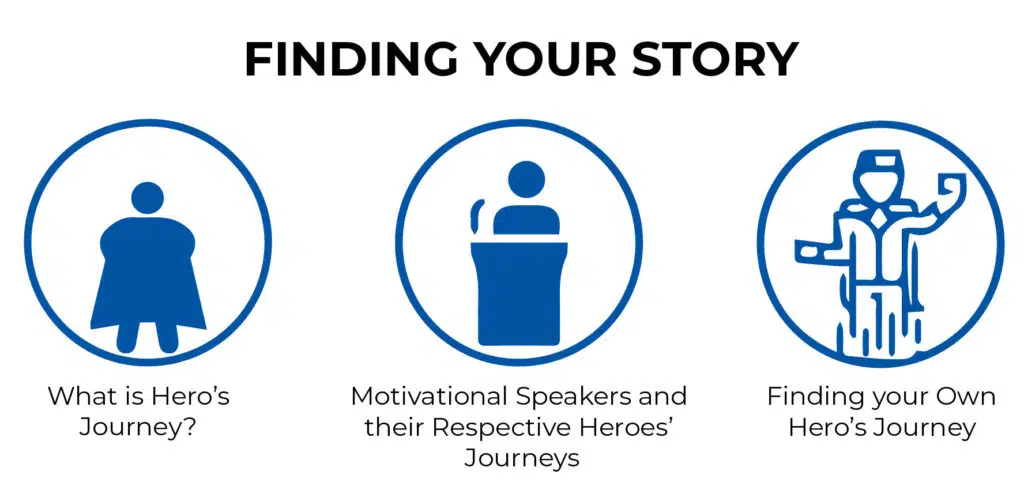
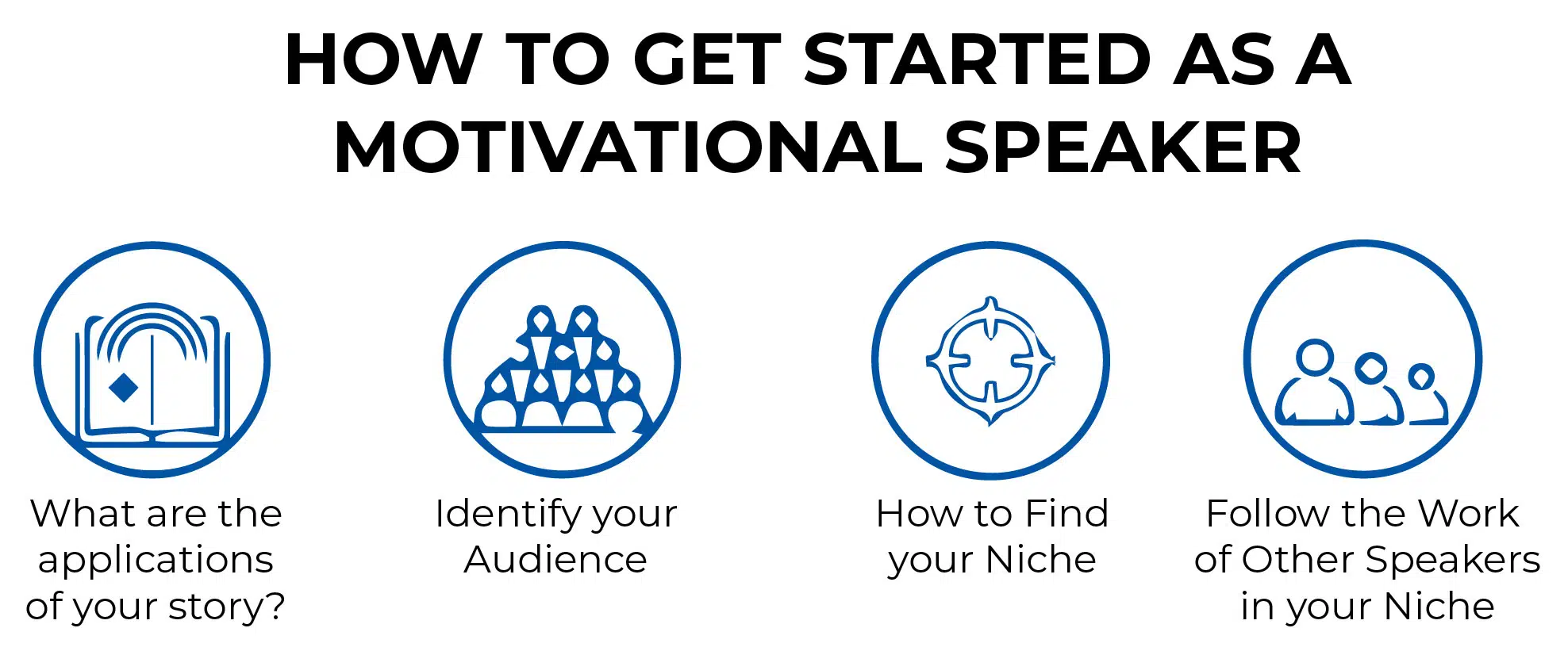
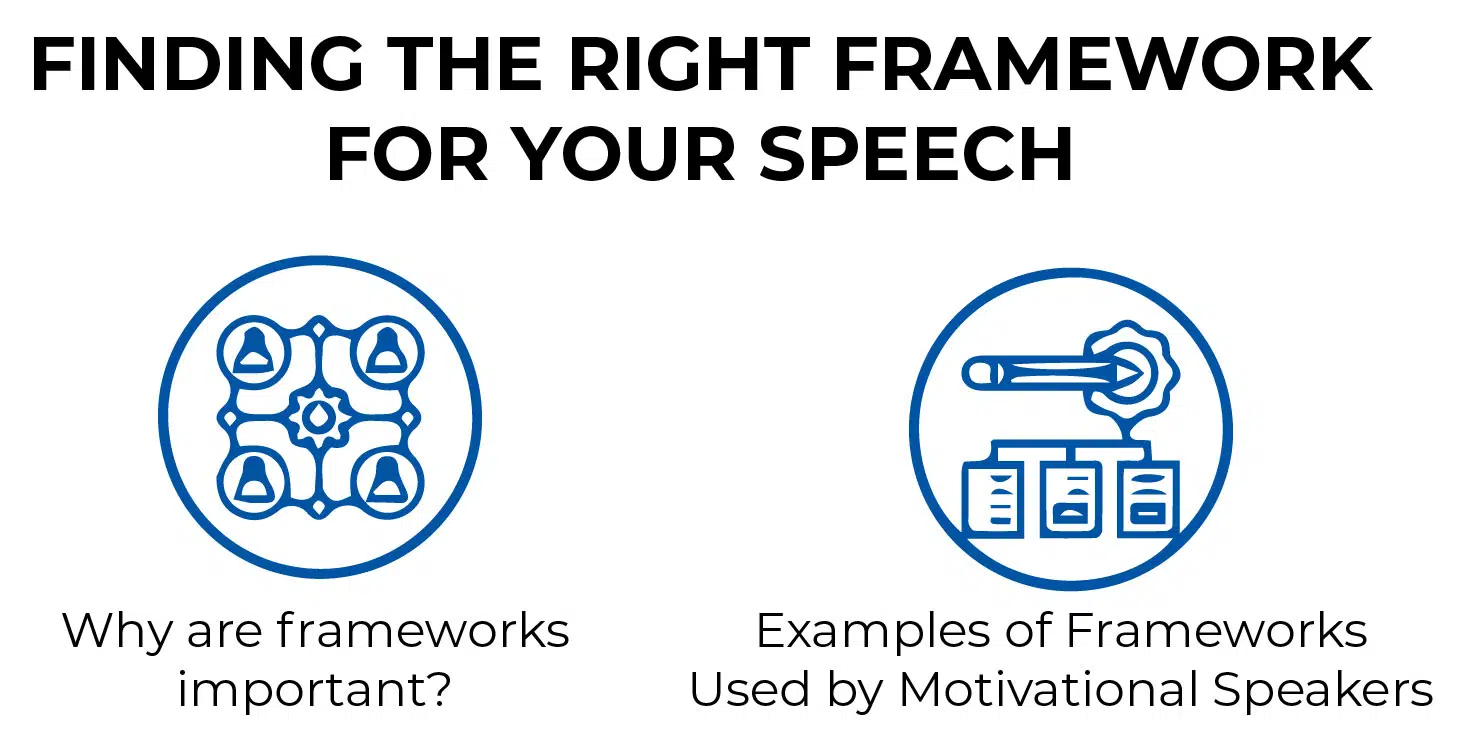
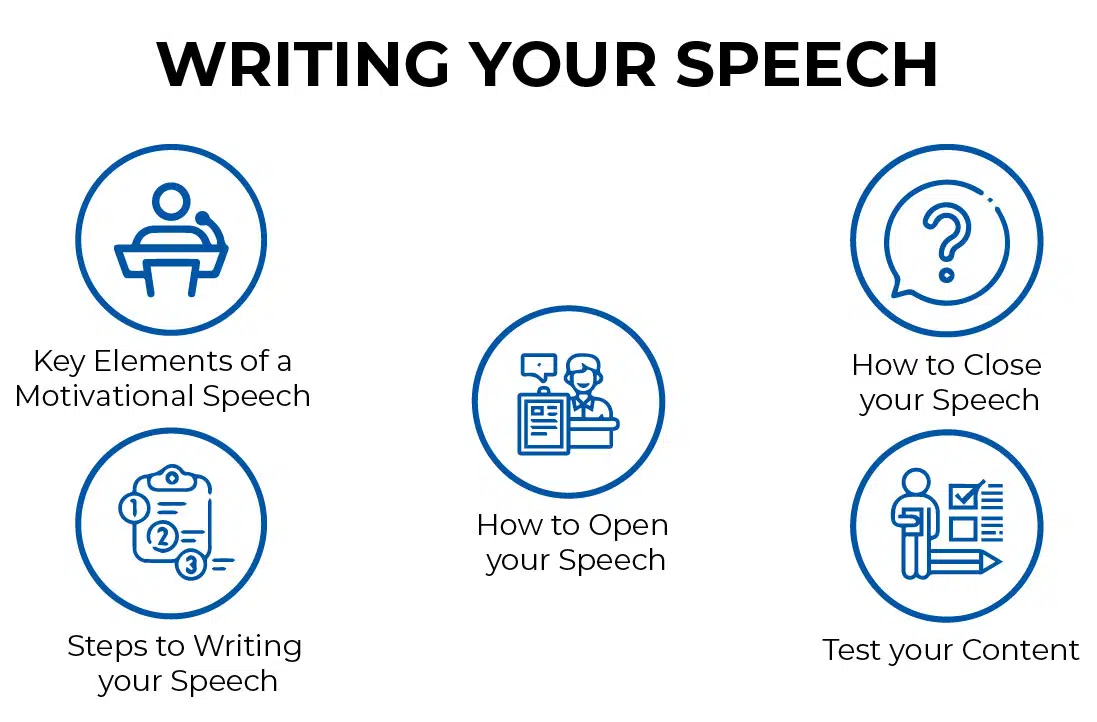
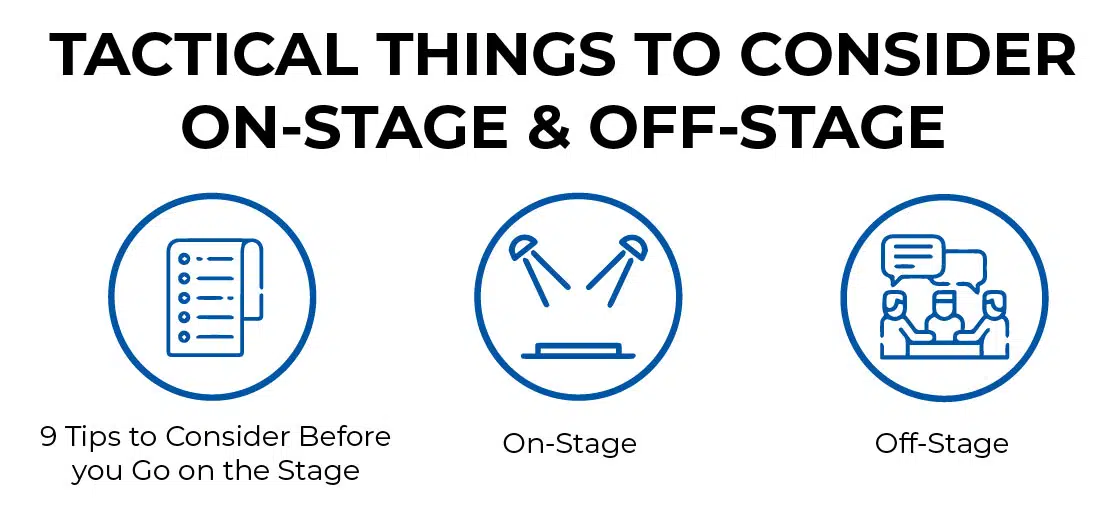
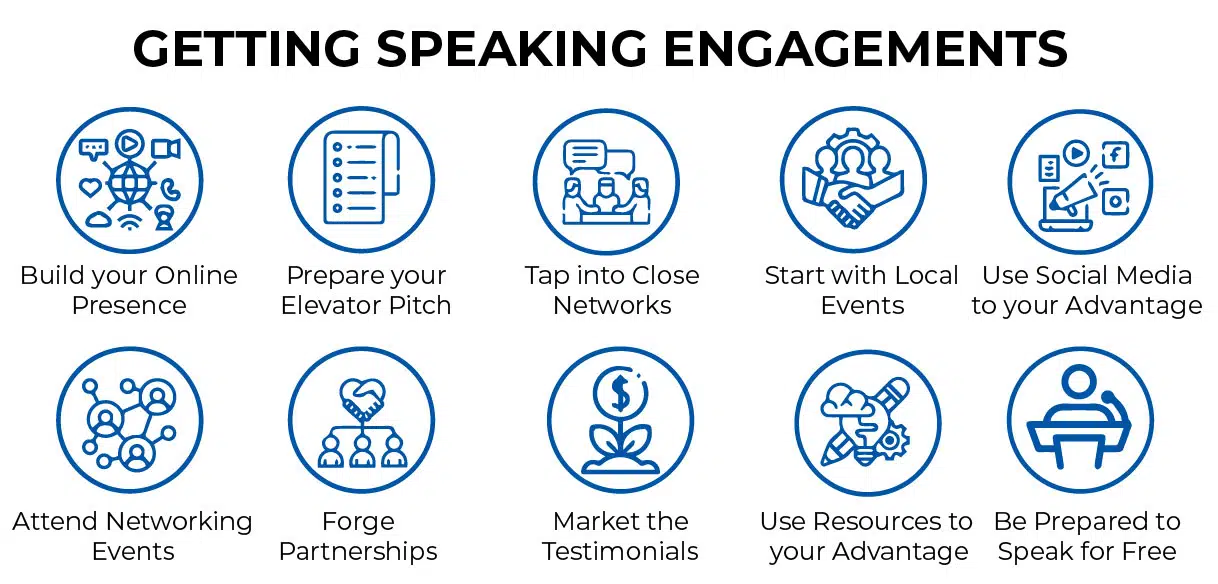
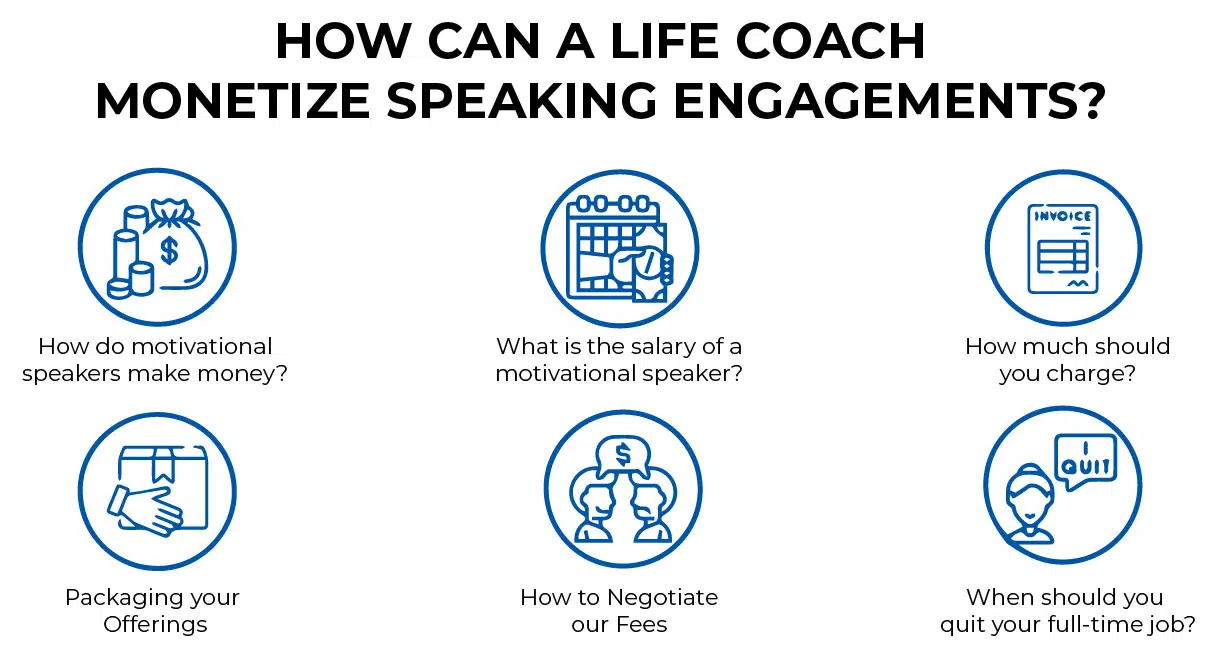
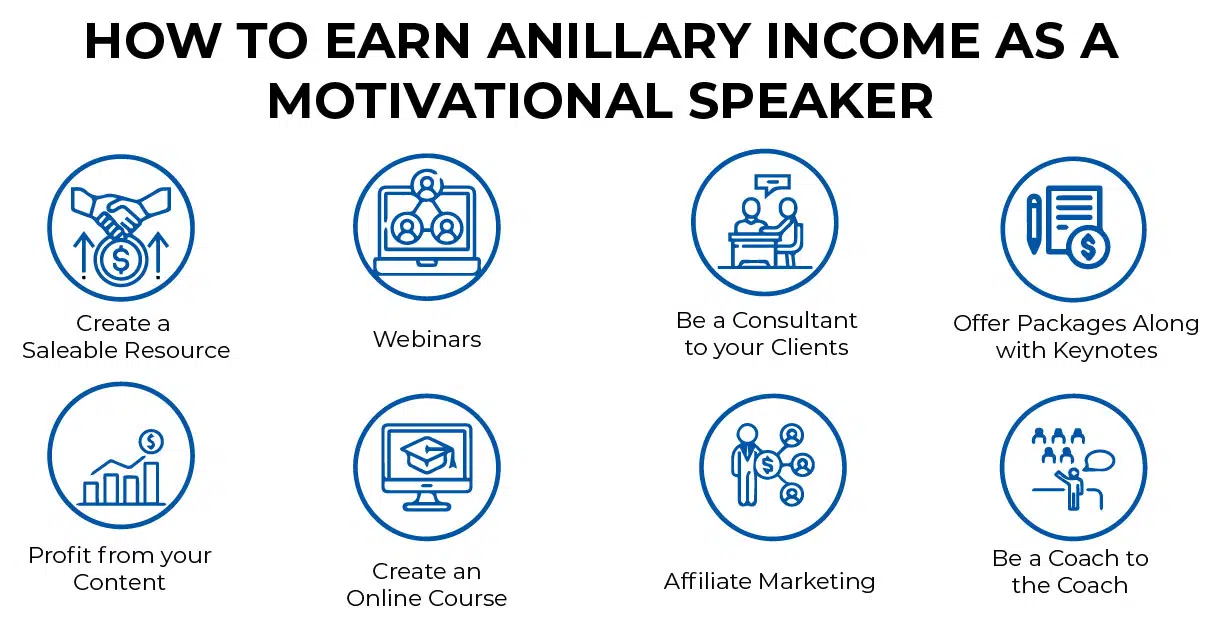
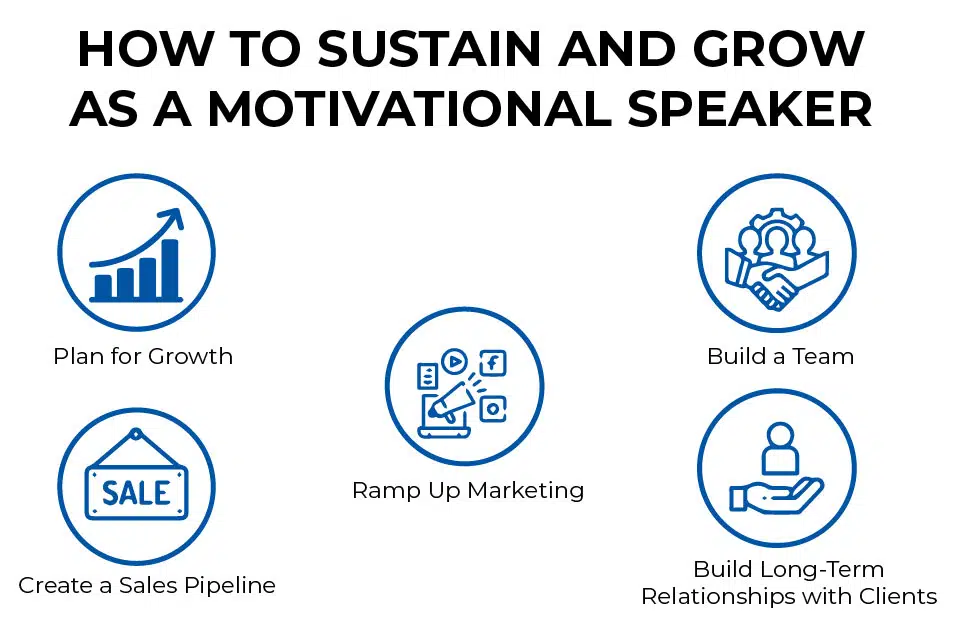





As wonderfully illustrated in the article, it is an elaborative guide on how to be a motivational speaker and help others to achieve their targets. This guide helped me to get started with becoming a motivational speaker and find the right framework for my speech orientation.
I always wanted to become a motivational speaker and lost hope after I got married. As a divorcee, when I read this article I was swayed away with tears achieving something. So, I started blogging on motivational speeches and building a career in motivational speaking. Thank you for this informative guide.
Becoming a motivational speaker is not an easy task but this article has everything that one needs to learn about the motivational speaking domain. The field is challenging but this article has clearly defined all means on how to become a motivational speaker.
I wasn’t sure that the motivational speaking field can be luxurious too along with benefitting others. This simple guide has helped me find out how to get speaking gigs, monetize my motivational speeches, build a podcast channel, effectively leverage other social media and sustain and grow as a speaker.
Becoming a motivational speaker has always excited my nerves but I didn’t know how to become one. I researched on other platforms about the same but couldn’t get a clear-cut answer or solution. That’s the time when I came across this article, which has helped me discover the flip side of the coin.
I express my sole gratitude to this article for saving my career as a motivational speaker. Although I am an influential speaker somewhere or around I lacked that emotion to communicate indirectly with my clients. This guide has helped to refine and redefine my skills.
At every point in time, someone or the other needs to hear motivational speeches as they lack continuous motivation. This article has very well explained how to maintain constant motivational levels.
My writing skills weren’t up to the mark, and I used to make silly mistakes. When I read the article, I understood these mistakes and world upon them to get better results. Now, I am much more confident about writing motivational speeches.
This is an efficient article to describe different perspectives easily. It is a highly persuasive form of public speaking that builds an emotional connection with the audience to motivate and stimulate them to take rightful, necessary actions.
This is a brilliant guide that efficiently defines the work of the motivational speakers, its process on how to become one, what are the requirements, training, and certifications. It also gave its types and classification.
One of the best guides on motivational speaking which can motivate all age groups because of its self-explanatory feature. The guide is really effective in the development of the right kind of attitude and motivation.
I wanted to try a motivational speaking career and wanted to become a motivational speaker. The article described who a motivational speaker is, how does it functions, and what are the benefits of becoming one. The article was well written and covered most of the points.
As depicted in the article, a motivational speaker is more than a person who can motivate people to achieve their personal and professional goals but a person who can ease their problems and provide rightful direction. Extremely loved this concept.
The article was overall well written with good formatting and illustrations. The article has turned out to be helpful in direction settling, encouraging, and motivating to complete the tasks and try to seek a potential reward for that task.
A very useful guide to demonstrate all the aspects of motivational speaking and its type. A reader has to only pay attention to the quality rather than its size because the important terminologies are already embedded in the article. Very grateful for the article. Thank you very much.